




























Remember technology is only good if it is developed in a pursuit of the dream of a better world ,








































Remember technology is only good if it is developed in a pursuit of the dream of a better world ,










Boost your company’s productivity!

Take your business to the next level with our impactful training on Generative AI!
In just half a day, dive into the world of AI and discover how it can revolutionize your professional routine. Our sessions are designed to equip you with concrete, ready-to-use skills.
Don’t miss this opportunity!
This intensive 4-hour training will give you the tools to quickly integrate Generative AI into your processes. The result: increased productivity and a visible impact on your business.
WATCH NOW: NEXUS2050 VIDEOS ON YOUTUBE!
Scan the QR code to access the complete collection of Nexus2050 videos. Relive and rewatch all the inspiring conferences and highlights.
With 5,600 attendees from 50 countries, 312 speakers across six stages, 150 startups, 100 exhibitors, 640 matchmaking sessions, six side events, and a closing dinner attended by 900 participants, the inaugural edition of Nexus2050 has delivered on its promise.
The event successfully established Luxembourg as a new international hub for technology, gathering experts, startups, venture capitalists, media professionals, and institutional representatives from around the world.
The event focused on key themes such as sustainability, cybersecurity, and fintech—leveraging Luxembourg’s status as a leading international financial center— along with the emerging field of generative AI. Ukraine was featured as the guest country, further underscoring Nexus2050's ambition to attract a global audience while showcasing Luxembourg’s growing tech and startup ecosystem.
For its first edition, the challenge was twofold: to establish Nexus2050 as a must-attend international event and to mirror Luxembourg’s unique scale— intimate enough for meaningful networking, yet large enough to attract significant players to the halls of Luxexpo.
The second challenge was time. With just six months to organize, success came through the dedication of an extraordinary team and the collaborative efforts of hundreds of people. Government officials, local and European institutions, as well as representatives from around 300 companies—exhibitors, partners, startups, and speakers—played a crucial role in making this event possible. As founders of Nexus2050, we extend our deepest gratitude for their relentless efforts.
To commemorate the event, we have released over 100 videos on our YouTube channel, offering both inspiration and highlights from the first edition.
Looking ahead, we have been actively engaging with our premium institutional partners, exhibitors, and attendees to shape the second edition. Feedback from satisfaction surveys has been overwhelmingly positive—your message is clear: Nexus2050 must return.
We are excited to announce that the second edition will take place on June 17 and 18, 2025, once again in Luxembourg City.
As we prepare for next year’s event, we welcome your input. Help us make Nexus2050 2025 even more memorable, inspirational, and impactful, generating new business opportunities, funding, and ideas.
See you again in Luxembourg, where Nexus2050 – the International Tech Pulse – will once again set the pace for innovation.
Warm regards,

Co-Founder

Co-Founder



39 Émilie Allaert «DLT helps avoid greenwashing»
44 PureTech Innovations: AI, Cybersecurity, Blockchain, and Beyond
46 Daniel Kahn «Don’t rush into going international»
47 Technology for business sustainability
48 Deepfakes: many risks and a few opportunities
56 Skills Stage: Skills Unleashed: Nexus2050’s Innovation Showcase
58 Smart cities: the future lies in cooperation
59 Guy Castegnaro on AI in the workplace «The time to act is now»
60 With Goodbytz, the chef is a robot
61 Women in Tech is looking for «the next Mark Zuckerberg»
62 From virtual reality to tokenisation in education
70 Startups Demo Arena: Innovators in the Spotlight
82 Sigma Stage: Bridging Digital Matchmaking, Connectivity, and Super-computing
87 Paperjam Next Photobooth
90 In photos: Nexus2050 pub crawl and networking through old town
92 In photos: Closing Seated Dinner
94 Student Bus Tour to SES and Foyer
102 Thank you to our sponsors



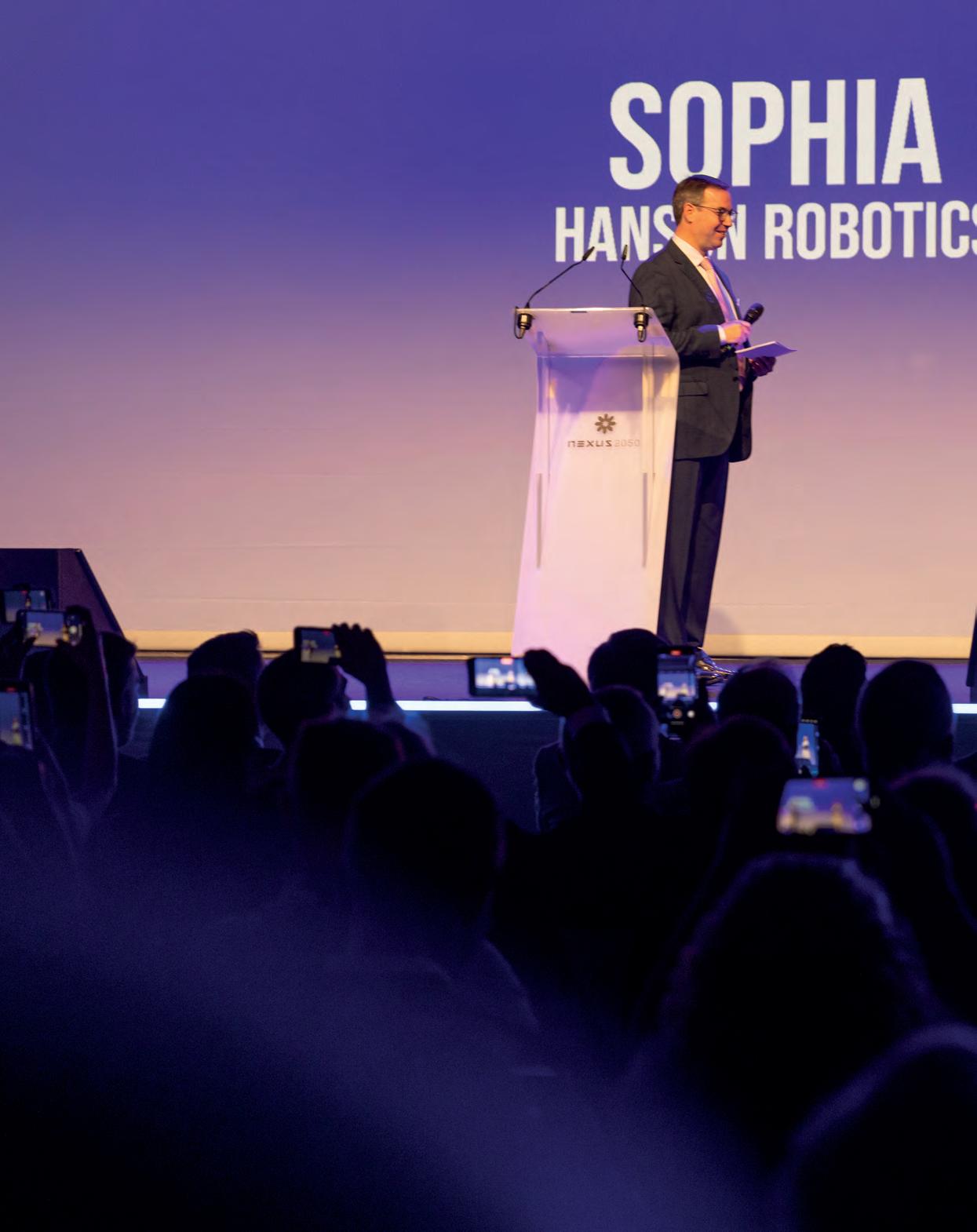

With a capacity of 900 seats and hosting 22 conferences and panels over two days, the Main Stage was the beating heart of Nexus2050. Guided by the talented Avanti Sharma as the Master of Ceremony, the Main Stage set the tone for the event. We began with a grand opening ceremony and delved into a diverse array of discussions and presentations on cuttingedge themes such as Generative AI, Sustainability, FinTech, Marketing, Technology Trends, AI Regulation, Cloud Computing, Cybersecurity, Electric Vehicles (EVs), and Neobanks.
Written by THIERRY LABRO
Two days after Grand Duke Henri announced that his son Guillaume would gradually take over the reins and as negotiations open for Ukraine’s accession to the EU the crown prince inaugurated Nexus2050 alongside the world’s most advanced humanoid robot and representatives of the Ukrainian government.
“I’m very honoured, and very proud, to be taking part with you in the Nexus2050 opening ceremony. I’ve been to various events, such as Vivatech, recently, and they all have in common that they are the biggest. But I have to say that this event is going to be even bigger. But in my small country, we’re used to saying that it’s not the size that counts.” Two days after his father, Grand Duke Henri, announced that he would become lieutenant-representative in October, Crown Prince Guillaume was all smiles as he hailed the coming together of all the players around the organisation of this first edition of Nexus2050.
“Combined with Venture Days in November, this shows where Luxembourg wants to go. In a constantly changing environment, innovation is more than just talk. Innovation gives us the opportunity to shape the future we want, the power to fuel
a strong, future-proof economy, to build a world where sustainability and social wellbeing, combined with technological needs and opportunities, have a positive impact.”
If artificial intelligence continues to develop, it will be “the cornerstone of innovation,” stressed the hereditary grand duke. “We know that to develop our economy in this direction, we need to have good connectivity, everything we need to operate data and work on cyber security.”
The hereditary grand duke pointed out with gravity that the other aspect of this development is the emergence of disinformation and fake news, such as that which saw him and the grand duke, as well as Prime Minister Luc Frieden (CSV) being “used” in a false campaign for an investment company. “This is a serious threat because it undermines confidence in our society, manipulates public opinion and
destabilises democracy. Tackling these problems requires additional efforts from a range of actors, from politics and the public sector to business and the media.”
It was Guillaume himself who announced Sophia’s arrival on stage, a moment as unexpected as Sunday’s announcement at the Philharmonie. The hereditary grand duke launched into a conversation-interview with the world’s most advanced humanoid robot. “Do you think we should regulate artificial intelligence more? Or have less regulation?” he asked.
“We need to find the right balance,” Sophia replied, “to encourage developments that benefit humanity while limiting the negative aspects as much as possible.”
“Thank you, Sophia. I can see that the economy minister, Lex Delles, is taking notes!” replied Guillaume. “One last ques-


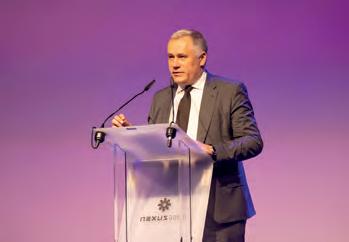


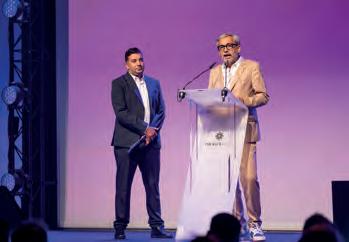
tion, Sophia,” he went on. “As you may know, my father made a big announcement on Sunday. Do you know when I will become grand duke?”
“I’m just a robot and an artificial intelligence not capable of predicting the future,” Sophia replied, insisting that Luxembourg was lucky to have a grand duke.
“Fascinated” by the Luxembourg ecosystem
The speeches that followed were more conventional. Economy minister Lex Delles (DP) insisted on the need for an event like this to put Luxembourg on the map, before outlining the various ways in which companies and startups can be helped. The European Commissioner for Innovation, Research, Culture, Education and Youth, Iliana Ivanova, said she was “fascinated” by the Luxembourg ecosystem, a country where she has lived for ten years. She stressed the importance of attracting and retaining talent in Europe, the AI Act and the guidance provided by the European Commission, and the importance of exchanges and opportunities to discuss these issues.
Another highlight of the ceremony came with the eagerly awaited words of the deputy director of the office of the president of Ukraine, Igor Zhovkva. “As you know, negotiations on Ukraine’s accession to the European Union opened this Monday in Luxembourg. It’s a long journey, but we’re ready for it!” This enthusiasm drew applause from the audience. He went on to outline Ukraine’s strengths, from the digitisation of public services, with the world’s first digital passport issued at the snap of a finger, to the emergence of the world’s first “drone force” in an army and the strategic importance of cyber security.
1 Carlo Thelen, CEOLuxemboug Chamber of Commerce
2 Igor Zhovka, Deputy Head of Office of the President of Ukraine
3 Iliana Ivanova, Commissioner for Innovation, Research, Culture, Education and YouthEuropean Commisssion
4 Lex Delles, Minister of Economy, SME, Energy and Tourism - The Government of Luxembourg
5 Maurice Bauer, Chief Alderman - City of Luxembourg
6 Mike Koedinger and Kamel Amroune, Co-founders of Nexus2050
Written by AARON GRUNWALD
Claude Marx, the head of Luxembourg’s CSSF regulatory agency, has called on European leaders to refrain from issuing specific AI rules for the financial industry.
The head of Luxembourg’s financial regulator has said that the use of artificial intelligence technology in the financial services sector should not be regulated. If AI in finance eventually needed to be regulated, then policies should not be set by the EU,
he said. The comments came at the Nexus2050 technology conference, held at Luxexpo, on 26 June 2024.
When asked if specific AI regulation is required for the financial sector, “my response is no,” stated Claude Marx, director general at the Luxembourg Financial Sector Supervisory Commission (CSSF). This view is “not universally shared” among European financial regulators, he added. However, Marx argued that it “would be foolish” to issue financial AI rules when “no regulator knows today” exactly what AI tools are being used by firms and how, and “how risks are
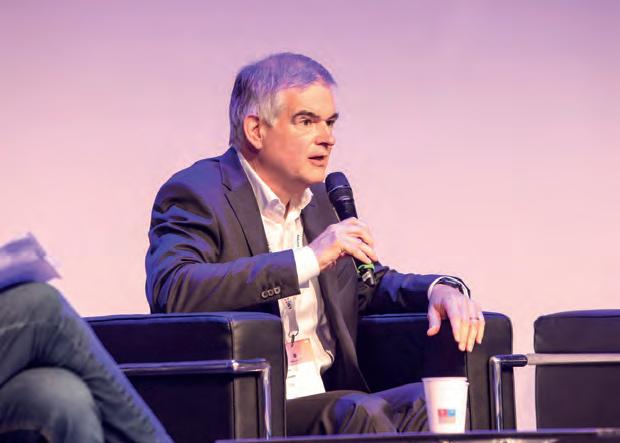
being assessed or not” at those companies. Marx said that should a full census of AI activities be carried out and “if we came to the conclusion that something needs to be regulated... that should not happen at EU level” but rather international rules would be needed. “We need to be careful not to build ‘fortress Europe’,” he said. Something similar to the Basel banking agreement would need to be struck, to avoid disconnecting Europe with the fast pace of change in places like the US, China and India. Marx added that at many financial firms, governance at board level is “not fit for purpose” anymore and many company leaders “don’t have the right mindset” to keep pace with technological change.
Speaking on the same panel, Stéphane Pesch, CEO at the Luxembourg Private Equity and Venture Capital Association (LPEA), agreed that additional regulation was unnecessary, saying it was good to “not regulate something that is not there yet.” But he stressed that firms should be sure that AI tools are fully tested before they are deployed. There should be no biases, the models should “really work” and privacy needs to be maintained, he said.
Written
LYDIA
The founder of neobank N26 Maximilian Tayenthal talked about growing pains, KYC and the possibility of going public (or not) during a fireside chat with Laurent Hengesch, Ilavska Vuillermoz Capital’s managing partner, at the Nexus2050 tech conference on 26 June.
Founded in 2013, N26 is the first 100% mobile bank to have been granted (and to operate with) a full German banking licence from Germany’s federal financial supervisory authority, the Bafin. The neobank in 2021 completed a $900m round of funding and counts 8m customers worldwide. “We’ve seen this massive shift in user behaviour,” said N26 co-founder, co-CEO and COO Maximilian Tayenthal during a fireside chat with Laurent Hengesch, managing partner at the VC firm Ilavska Vuillermoz Capital (which has invested in N26), at the Nexus2050 tech conference in Luxembourg on 26 June 2024. Instead of going to a physical bank branch, people start to bank on their web browser or smartphone. This transition has already happened in other industries--travel is now booked via the internet instead of in agencies, people shop and listen to music online rather than visiting stores or buying CDs-and it’s happened much more quickly than in banking.
Customers are focused on the look and feel of online mobile products. And “that is our niche,” said Tayenthal, highlighting the importance the neobank places on providing the best possible digital experience. Looking at those other industries, it wasn’t the big players that disrupted the

industry, he argued. “I believe it won’t be the big banks that really change the way people around the globe do their daily financial transactions.”
When you grow a company, said Tayenthal, you need to take a lot of risk. Challenges have included fundraising, convincing investors, “maintaining the agility of a startup in a highly regulated environment” and recruiting staff. As the number of customers grew, the number of team members had to grow as well. “That comes with tremendous growth pains,” he said. “It’s about getting the best talent, retaining them with the right tools in your hand, developing a vision.”
Written by THIERRY LABRO
Photo ROMAIN GAMBA
Fifteen of the 20 startups that qualified for the 14th edition of Luxinnovation’s Fit4Start programme were awarded their diplomas Wednesday evening at Nexus2050, at Luxexpo The Box, in front of 400 people. It was an opportunity to see how well they have mastered the art of the effective pitch.
“We are looking forward to seeing how these companies will evolve over the coming years and make an important contribution to the future development of Luxembourg’s startup community and--beyond that--our economy and our country,” commented Luxinnovation CEO Sasha Baillie. “This certification in the Fit4Start programme is a key step on the road to success for these young startups and gives them the opportunity to be more visible and to make contact with private investors who keep a close eye on such companies.”
Twenty start-ups were selected from 365 applications from 58 countries. Since the initiative began--this is the 14th edition--almost 3,000 applications from all over the world have been submitted.
“Fit4Start has become an important visibility tool for the Luxembourg startup ecosystem and is a real asset for innovative young startups in their early stages,” says Sven Baltes, manager, startup relations at Luxinnovation. “We will continue to support innovative companies in Luxembourg and those wishing to set up in the grand duchy, with personalised support from our Fit4Start experts. The aim is to integrate them into the country on a long-term basis and support their development and growth

efforts.” The 15 startups received six months of specialised support, as well as €50,000 of funding each from the ministry of the economy if they are integrated into Luxembourg. Those companies that manage to raise funds and employ at least two people will be eligible for up to a further €100,000 in state aid.
At the end of the ceremony, Baillie officially launched the call for applications for the 15th edition of the programme, which closes at noon on 12 August. Twenty startups will be selected in the same three categories: digital, health technologies and space.
Three startups in health technology Invitrolize (Luxembourg) markets Alissens, developed in the grand duchy by the Luxembourg Institute of Science and Technology (List). It’s the only test available for identifying respiratory sensitisers.
PsyTech VR (United States) is a scenario-based virtual reality micro-training system for mental health and well-being.
Sonia (Germany) automates medical documentation and coding for dentists, freeing up 25% of their time for additional treatments and reducing process costs by up to 50%.
Three startups in the space sector
Symbiose Management (France) helps asset managers invest in nature and fight climate change by creating a symbiosis between nature and finance using space technology.
Written by ELSA LSURGER Photo EVA KRINS/MARIE RUSSILLO
At a time when mental health is gradually becoming a divisive issue, American startup PsyTech VR is breaking new ground by offering a new form of virtual reality therapy. The company presented during the Nexus2050 technology conference at Luxexpo.
PsyTech VR, founded in 2020 and made up of experts in psychology, neuroscience and technology, is committed to bridging the gap in affordable yet efficient mental healthcare through its immersive technology based on multiple 360-degree scripted videos. Its aim is to revolutionise the treat-
ment of mental disorders. It promotes the wellbeing of its customers by overcoming stress, anxiety and anger. The company mainly targets psychiatrists and psychologists who want to use virtual reality during their sessions, in particular to speed up diagnosis and therapy while remaining effective, accessible and easy to use. PsyTech VR provides healthcare professionals and patients with a virtual reality headset containing an application with a wide choice of videos depending on the problem expressed. How does it work? The patient wearing the headset and sensors opens the resource and is plunged into a situation in which he or she has to confront his or her fear. The specialist also has a dashboard at his disposal, enabling him to analyse all the patient’s reactions. This technology can be
applied to a wide range of situations, including people who need to manage their stress with breathing exercises, such as athletes. The startup’s users come mainly from the United States, with a few from the Middle East. As part of Luxinnovation’s Fit4Start programme, it hopes to continue to grow, particularly in Europe. PsyTech VR expects to have a 50% share of the global market within the next five years

Written by MARC FASSONE
Photo MARIE RUSSILLO
The regulatory aspect of artificial intelligence was one of the key topics on the second day of the Nexus2050 conference on 27 June. With the EU adopting a regulation on AI in May, Jean-Louis Schiltz looks back at the “spirit of the law” that should prevail in this area.
Jean-Louis Schiltz has had several lives. First, in politics. The lawyer was elected to the Chamber of Deputies under the CSV colours, but did not sit. He was called directly into government, where he held the posts of minister for cooperation and humanitarian action and minister for communications. He was also defence minister from 2006 to 2009. Schiltz resigned from all his offices in 2011 for personal reasons and once again became a lawyer. As a senior partner at Schiltz & Schiltz, he specialises in technology issues. An honorary professor at the University of Luxembourg, he devotes his teaching and research to all aspects of ‘innovation through law,’ with a particular focus on fintechs.
Should AI be regulated or not?
Jean-Louis Schiltz: I believe that the objective of any regulation of artificial intelligence must be to create a framework of trust. With the growing number of users of this technology, particularly ChatGPT, there is a real need to establish such a framework to avoid abuses. So the answer is clearly yes. The underlying question, given the speed at which things are moving, is whether it is not already too late for the regulator to seek to regulate the phenomenon? Can it keep up with innovation? This is the crux of the problem, and for the reg-

ulator it comes down to the following two questions: should we regulate AI itself or the applications? In my view, it is the applications that should be regulated, and that is the choice that the European Union has made. The second question for regulators is whether to adopt very detailed regulations, as we did with the GDPR (General Data Protection Regulation). That’s what we also did for the AI Act, which runs to 378 pages. The other approach would have been to opt for a French-style approach based on principles. That was not the fundamental choice made for the regulation of 21 May 2024. After all, it has 58 articles... Look at the Civil Code, it’s 200 years old. latter approach, if followed rigorously, allows us to keep up with and adapt to new developments. In nine cases out of ten, we will find a principle to link a new use to it.
If you regulate on the basis of use cases, it quickly becomes very complicated.
European regulations have opted for a risk-based approach. Isn’t that too simplistic?
As with the Dora regulation [Digital Operational Resilience Act], there are a certain number of principles that underlie all European regulations affecting technology. First, there is the principle of proportionality, then accountability and then the risk-based approach.
Written by MARC FASSONE Photo EVA KRINS
Alexandre Mars was present at the Nexus2050 tech conference at Luexexpo on Thursday 27 June. For the occasion, he gave a keynote speech on how to make an effective commitment to a fairer world. He then spoke to Paperjam about his career and what drives him.
Alexandre Mars began his entrepreneurial career at the age of 17. His successes gave him the financial security he needed to fuel his social ambition: to be useful. He first created Epic, a global foundation that helps empower and protect children, young people and the planet by bridging the gap between impactful non-profits and individuals and businesses looking to enact positive change. He has also set up
Infinite, a social edtech that supports students from disadvantaged backgrounds in gaining access to top schools, universities and the professional world through an innovative student loan offering. Loans that these students repay by financing other students. A “virtuous Ponzi scheme,” as he describes it. His passion for sport and his commitment to greater social justice have also led him to become an ambassador and member of the board of directors of the Paris 2024 Olympic and Paralympic Games. He has also written several books. For Vanity Fair, he is one of the 50 most influential French people.
How does an entrepreneur become a philanthropist?
Alexandre Mars: I don’t think there’s necessarily a logical link between the two. The question is rather how a citizen, whether entrepreneur, employee or intrapreneur,

becomes a philanthropist. You just have to open your eyes and realise that the private sector has to do a lot of things for other people, quite simply. You can’t expect the public sector to do everything.
You use the expression “open your eyes.” What made you open your eyes? My mum. A long time ago. I grew up with an extremely altruistic mum who often looked after people. In fact, that’s the way I was brought up and helping people is something that comes very naturally to me. Education plays a big role, that’s for sure. And then your entourage, your wife, your best friends... It’s the people around you who sometimes help you to find that path in life.
You’re also known as a successful entrepreneur. How do you turn a philanthropic activity into a business case? It’s true that Epic, a not-for-profit start-up whose aim is to amplify the ability of people and companies to make an impact through giving, has become a business case. In 2019, the Harvard Kennedy School published a study on Epic, highlighting its innovative new social impact model.
That said, we are a not-for-profit organisation, meaning we have no business model. This proves that it can be done. We all grew up with a very ‘Milton Friedman’ vision, the great economist who said that a company’s social responsibility was to make a profit.
KEYNOTE
Invest in the Future Navigating Investment Trends and Our Responsibilities by Anabel Ternès von Hattburg (Futurologist, Keynote Speaker, Thought Leader, Author)


KEYNOTE
How Generative AI will change productivity and business forever by
Emmanuel Vivier (Cofounder & Principal Analyst - HUB Institute)

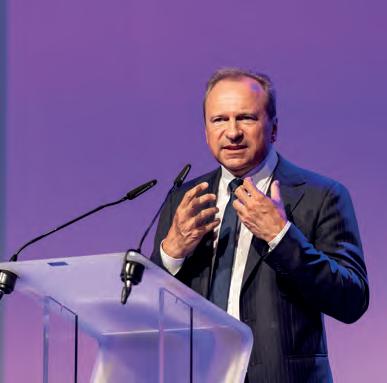
KEYNOTE
How the SDGs can learn from the journey of Technology by Avanti Sharma (Pre-teen Technology Specialist-Workshop4Me)
OPENING REMARKS : Gilles Roth (Minister of Finance, The Government of Luxembourg)

The future of EVs –how can we best ensure sustainable mobility ?
With the participation of Amélie de Valroger (Global Head of Consultancy and Electric Solutions - ALD Automotive/ Ayvens) and Avanti Sharma (Pre-teen Technology Specialist-Workshop4Me)

PANEL :
Climate Trajectory and Transition Plans towards 2050: Best Practices and Essential Dimensions for a Successful Transformation Plan
With the participation of Thierry Langreney (President and Founder -Les Ateliers du Futur), Tanguy Polet (CEO - Swiss Life France), Émilie Barrucand (Anthropologist and Chief Impact Officer)
Moderated by Bettina Werner (Partner - Deloitte)
Emerging Technologies : Catalysts for Sustainability or Potential Obstacles?
With the participation of Chris Webb (Head of Climate Change Europe & Global Head of Carbon Markets | Group Sustainability - HSBC), Merete Clausen (DG GROW - Director for InvestmentEuropean Commission)
Moderated by Ronan Vander Elst (Partner, Digital & Technology Consulting Leader - Deloitte)

GAME CHANGERS: unlocking human potential with technology by Eric de Quatrebarbes (CEO of the Europe Cluster Business Unit – Capgemini)

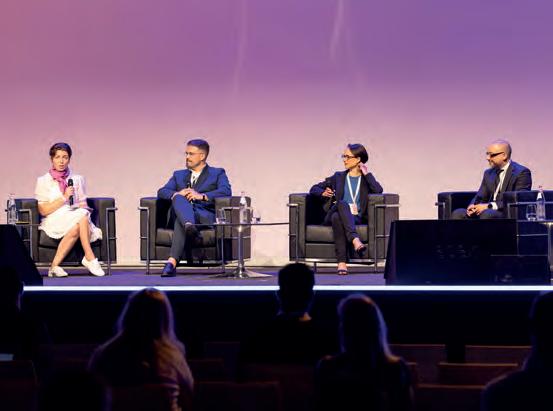
PANEL :
Leadership in Marketing : Navigating Transformation and Innovation
With the participation of Véronique Lefevre (Head of Digital Marketing & Events - Airbus Defence and Space – Intelligence), Giovanni Gribaudo (Global Director of Digital Excellence - Ferrero), Anthony Kukaj (Digital Marketing Lead - Lombard International Assurance) Moderated by Cécile Lorenzini (Managing Director – VANSKEN)

KEYNOTE :
UTOPIA: Unstoppable, Tamperproof, Open Platform for Independent Autonomy by Dominic Williams (Founder & Chief ScientistDFINITY Foundation)


PANEL : Scaling AI Along the Value Chain
KEYNOTE: Sovereign AI, National Interest & Technology Innovation by David Shrier (Founder & Managing DirectorVisionary Future LLC)
With the participation of Eryka Lehr (Chief of Staff in Global Affairs – Google), Stéphane Fisch (Chief Information Officer, Digital Transformation Leader, IT Strategist), César Maklary (Co-Founder and CEO – FluidStack), Eiso Kant (CTO and Co-Founder – poolside) Moderated by Thierry Kremser (Advisory Partner, Deputy Advisory & Technology Leader, PwC Luxembourg)
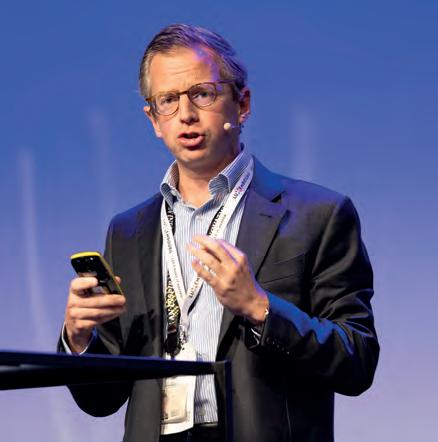
KEYNOTE:
A time for Business Model Reinvention by François Mousel (Managing Partner - PwC Luxembourg)
FIRESIDE CHAT :
The Ying and the Yang of AI
With the participation of Mark Tluszcz (CEO and Managing Partner - Mangrove Capital Partners) and Yannick Oswald (Partner - Mangrove Capital Partners)


FIRESIDE CHAT :
Maurice Lévy (Honorary Chairman of Publicis Groupe, Co-Founder of VivaTech) and Avanti Sharma (Pre-teen Technology Specialist - Workshop4Me


CLOSING WORDS :
Xavier Bettel (Vice Prime Minister, Minister for Foreign Affairs and Foreign Trade, Minister for Development Cooperation and Humanitarian Affairs - The Government of Luxembourg)
For its inaugural edition, Nexus2050 was honored to welcome Ukraine as the invited country. «We have partnered with the LuxembourgUkraine Chamber of Commerce to offer a comprehensive program, including three roundtable discussions, keynotes, and a selection of twenty Ukrainian startups with a focus on Cyberdefense, FinTech, Space & Telecom,» notes Mike Koedinger, cofounder of Nexus2050. “We believe in the pivotal role of technology in sustainability, not only as a means to achieve humanity’s netzero goal by 2050 but also as a crucial support for development and business continuity in Ukraine despite ongoing challenges.
Panel: Guest Country Ukraine: Cybersecurity
The panel discussion on Cybersecurity brought together leading experts from Ukraine to explore the evolving landscape of cyber threats and defense strategies. This critical conversation featured Dr. Oleksii Baranovskyi (PhD in Cybersecurity, professor in institutions the National Technical University of Ukraine “Ihor Sikorsky Kyiv Polytechnic Institute” and Blekinge Institute of Technology, Sweden), Mykhailo Verych (CRDF Global regional director) Serhii Prokopenko (Head of NCSCC Operations DepartmentDeputy Head of Information Security and Cybersecurity Directorate at the Staff of the NSDC of Ukraine) and Evgenia Paily (President – LuxembourgUkraine Chamber of Commerce) who discussed the latest advancements in cybersecurity technology and practices.

Panel: Guest Country Ukraine: Defence and MilTech
The panel discussion on Defence and MilTech delved into the cuttingedge advancements and strategic innovations driving the future of military technology. Esteemed experts from the defence sector Alexander Dmitriev (Advisor on unmanned automated systems and IT to the Commander of the Ground Forces of the Armed Forces of Ukraine), Volodymyr Ben (Head of the State Space Agency of Ukraine), Illia Neizvestny (Board MemberLuxembourgUkraine Chamber of Commerce) and Inna Perepelytsya (Senior Advisor Luxinnovation) converged to explore a range of critical topics. The discussion highlighted Ukraine’s significant progress in military technology, showcasing how emerging technologies are being integrated into defense systems to enhance operational capabilities.

Panel: Guest Country Ukraine: GovTech
Serhii Demediuk, Deputy Secretary of the National Security and Defence Council of Ukraine, discussed the integration of advanced technologies to bolster national security and defense. His insights focused on the importance of cybersecurity and digital infrastructure in protecting national interests. Nadiya Bigun, Deputy Minister of Economy of Ukraine, explored how digital transformation can drive economic growth, streamline government operations, and enhance public services. She addressed the economic benefits and challenges of implementing GovTech solutions. Oleksandr Porkhun, Acting Minister of Veterans Affairs of Ukraine, delved into the vitality of transforming city services through digitalization. He highlighted strategies for managing city services more efficiently, enhancing public safety, and promoting edemocracy to create a resilient ecosystem capable of withstanding challenges.


Business Model Reinvention (BMR) involves a fundamental rethinking and restructuring of how a company creates, delivers and captures value. It goes beyond making incremental changes and improvements to existing processes and strategies. It’s how a company fundamentally overhauls the core elements that drive its business, including value proposition, its profit formula, capabilities, process and resources.
Patrice Witz Advisory Partner, Technology Partner and Digital Leader, PwC Luxembourg
patrice.witz@pwc.lu
Kevin d’Antonio Luxembourg Business Model Reinvention Champion, PwC Luxembourg kevin.dantonio@pwc.lu
Don’t get left behind. Lead through disruption with the industry expertise, alliances and scale to build for bigger thinking. We start by identifying the right patterns of growth, tailored for you – whether it’s expanding into new digital products or entering new markets and ecosystems. Then we make your reinvention real – taking you from concept to creating and capturing new business value.
Whether you’re beginning your innovation journey or already pursuing reinvention, our expertise can help you achieve value capture quicker. Contact us now!
Written by MARC FASSONE
Photo ROMAIN GAMBA
Evgenia Paliy, president of the Luxembourg-Ukraine Chamber of Commerce, stressed the importance of cooperation to help Ukraine at the Nexus2050 tech conference at Luxexpo The Box on Wednesday. It’s a broad cooperation that goes beyond military matters and ranges from technology to education.
Asked what she hopes to gain from her country’s participation in Nexus2050, Evgenia Paliy, at the tech conference, answers bluntly. “I think it is important, in this period of conflict, to show the importance of cooperating with Ukraine. Charitable aid, financial aid and weapons are all very important. But technological cooperation is just as important.”
Need for cooperation on all fronts
The most obvious area for cooperation is cybersecurity. “We have suffered over a thousand cyber attacks in recent months. On this front line, we have demonstrated our resilience. All the tools we have developed are tested in real-life conditions.” This experience is backed up by a striking argument: “This frontline also affects Europe. We saw this during the recent election periods, when personal data was stolen or hospitals were attacked.” She hopes that awareness of the danger and the skills of the Ukrainians will encourage the establishment of new technological and financial partnerships.
The official opening of negotiations on Ukraine’s accession to the European Union on 25 June 2024 opens up other areas of

cooperation: “To prepare for Ukraine’s accession to Europe, it is also important to forge links with experts in regulation, technology, artificial intelligence and data protection. We need experts and we’re looking for partnerships to fund all these projects.”
The final area of cooperation concerns education and training. These are sectors in which Ukraine is not lagging behind. But the war has changed all that. With conscription, many people who could also be useful on the cybersecurity front are being sent off to fight. In the opposite direction, many veterans are sent back to the rear. There are currently a million of them. These people are not destined to return to the front line quickly. The Ukrainian government has plans for them: to
train them “quickly” in technological professions in general and in cybersecurity in particular. “To achieve this, we need experts in education and training.” Experts whose field of action will not be limited to veterans, but will include their families, including wives and children. “Without the support of Luxembourg and European countries, we won’t be able to do it.”
Institutions and partners of the Ministry of National Education, Children and Youth & the Ministry of Research and Higher Education
Closing the digital skills gap by providing in-person trainings in various sectors of IT.
Promoting and providing access to information about lifelong learning.
bee-secure.lu
Raising awareness among the general public for a safer, more responsible use of digital technologies.

techschool.lu
Empowering the next generation to become the digital leaders, entrepreneurs, and innovators of the future.
Your digital enabler for skill development in Luxembourg through content production, tool development, and community support.


The Finance Stage at Nexus2050 was a hub of insightful discussions and expert perspectives. Guided by the dynamic duo of Ethan Pierse and Jonathan Prince as Masters of Ceremony, the stage delved into critical themes shaping the financial world. Topics included FinTech innovations, blockchain, sustainable finance, investment strategies, regulatory challenges, and the impact of artificial intelligence on financial services. Attendees experienced a blend of keynote speeches, panel discussions, and interactive sessions that illuminated the future of finance.
Written by AARON GRUNWALD Photo MARIE RUSSILLO
Increased competition, higher customer expectations and rising costs are putting pressure on digital financial services providers.
Companies should focus on cost-effective fintech solutions that customers will actually use, two fintech CEOs have said.
The comments came on a “CEO insights” panel at the Nexus2050 technology conference on 27 June 2024.
The covid-19 pandemic induced a “complete revolution” in the fintech space, said Harry Gill, chairman of Pay10. The firm is a major player in instant payments and digital wallets in India and the Gulf region, and plans to expand into Europe. Pre-covid, cash was king in India, with a mere 500,000 digital payments per year, Gill stated. Post-covid, cashless transactions have taken over, with the firm clocking up 13bn digital payments just in the month of May 2024. He does not anticipate any decline in volumes: “No one wants to go back.”
Solutions as a service
Gill said firms designing fintech solutions should think in equal parts about “who will use it” and cost. “Cost should not discourage” potential customers--both businesses and consumers--from using an app. For example, Pay10 developed a QR code-based payment systems for small merchants like vegetable stand vendors for whom buying a dedicated payments machine would be prohibitively expensive.
“Technology is only as good as” its level of usage, said Gill. If a company builds “a great technology, but no one uses it,” then it’s a failure. In addition to a use case, companies should in parallel outline “the adaptability case and the profitability case.”

Rakuten is a Japanese conglomerate with more than 80 businesses in e-commerce, media, financial services and other sectors globally. Its European financial hub, based in Luxembourg, serves sister companies across the EU. Toshihiko Otsuka, CEO of Rakuten Europe Bank, said the group would like to extend this model--“payment as a service,” “banking as a service” and “lending as a service”--further across the group and to “non-Rakuten companies as well.”
Customer acquisition costs have been “skyrocketing” and don’t appear to be slowing down, said Otsuka. When asked why that was by the panel moderator, Jonathan Prince, co-founder and chief sales officer at Finologee, Otsuka replied that the number of “players are increasing and consumers are getting more demanding.”
The future of generative AI is being written now. Grab your keyboard and start authoring.
Acquire the knowledge to be on the front lines of generative AI revolution.
Join the Generative AI foundations challenge to:
• Dive into the powerful tools and techniques that drive AI engineering.
•Gain hands-on experience building applications with Gemini.
•Unlock the full potential of multimodal AI and so much more.
Scan the QR code below to start learning.


Written by LYDIA LINNA Photo LYDIA
Experts from Luxembourg’s financial industry talked about the challenges and opportunities in mutualisation during a panel at the Nexus2050 tech conference at Luxexpo on 26 June. We’re all in the “same boat,” they said, and mutualisation offers the sector the opportunity to improve things together.
Major challenges facing the financial sector today are regulation and the speed at which it comes, began Sinan Sar, managing director at United International Management, during a panel on mutualisation at the Nexus2050 tech conference at Lux-
expo on 26 June 2024. That makes it tough--especially for smaller players--to adapt quickly enough. It isn’t all just gloom though, he added, because regulation can be seen as an opportunity to create a good customer experience.
Staying on top of and implementing regulation are challenges, said Cara Browne, head of relationship management and provider oversight, but streamlining processes can help. This is an opportunity to collaborate and drive the market forward as “trailblazers,” she argued.
Competition is healthy, but compete where it matters
While Luxembourg might be a small country, added Abderrahmane Saber, partner in advisory & consulting at Deloitte, there’s a giant number of players in the financial sec-

tor. This “concentration” can lead to competition and players have to find a way to differentiate themselves.
Indeed, besides the weight of regulation, entities in the grand duchy are also facing cost pressures, said Serge Munten, head of operations at Banque Internationale à Luxembourg, making it key for them to find ways to differentiate themselves with clients. But it’s also an opportunity to develop shared services, he noted. Six Luxembourg banks, for instance, announced in November 2023 a shared ATM network. The next challenge is how to make processes even more efficient.
At the end of the day, with regulation, cost pressure and the need for more efficiency, we’re all in the same boat, said Sar. Luxembourg’s competitiveness as a country has dropped, but mutualisation is “a very powerful tool” that can help bring it back.
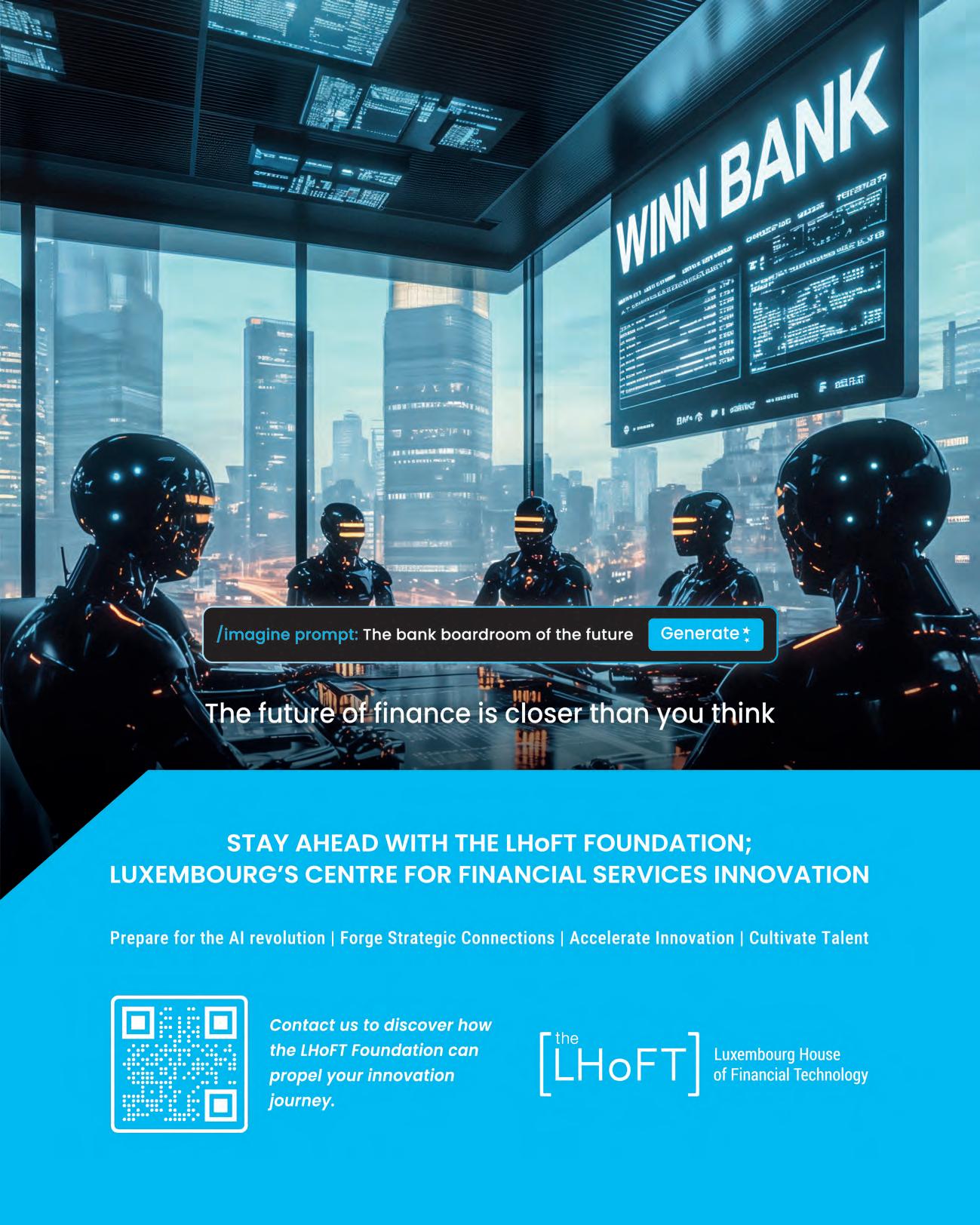
Written by KANGKAN
The CSSF’s Karen O’Sullivan addressed the slow adoption of distributed ledger technology, the evolving landscape of central bank digital currencies and the regulatory impact of markets in crypto-assets regulation at the Nexus2050 tech conference on Thursday.
On the second and final day of the inaugural edition of the Nexus2050 tech conference in Luxembourg on Thursday 27 June 2024, Karen O’Sullivan, head of the payment services division at the Luxembourg Financial Sector Supervisory Commission (CSSF), shared insights on distributed ledger technology (DLT), central bank digital currencies (CBDCs) and crypto- and digital assets. The session, moderated by Chris Hollifield, head of business development at Luxembourg for Finance, the grand duchy’s financial centre development agency, began with O’Sullivan highlighting the slow pace of DLT adoption in the financial world, though she acknowledged that its use is increasing.
O’Sullivan detailed that DLT applies to both financial and non-financial assets, each with distinct regulatory needs and obligations. She explained that for investment funds with native tokenised products, such as tokenised shares or units on DLT, the register can still be off-chain, requiring traditional transfer agents and conventional regulatory requirements. If a digital twin of the register is created, both on-chain and off-chain solutions are available without necessitating a new licence,

as the physical register remains regulated by traditional regimes. This has no impact on investors. However, in the case of a digital-only register, regulatory requirements change, necessitating investor awareness of these changes, particularly in the tokenisation of real-world assets, which could be traded on secondary markets.
Responding to Hollifield’s observation of the low uptake of DLT pilot projects, O’Sullivan confirmed that only six or so pilot projects using DLT had been considered by the CSSF, with none receiving final approval. She attributed the low uptake to three main reasons: the limited scope of permissible DLT applications, which exclude crypto-assets and are confined to traditional financial products like funds and shares.

















































































helping business flow
Our trusted partners.











Written by LYDIA LINNA
Amor Maclang and Alex Panican--representing associations from the Philippines and Luxembourg-talked about fintech around the world during the Nexus2050 tech conference at Luxexpo on 27 June. Delano caught up with them after to hear about the Lhoft’s catapult programme for Southeast Asia and the importance of not plucking talent away.
The Luxembourg House of Financial Technology in April 2024 launched an acceleration programme called Catapult: Inclusion SE Asia to boost financial inclusion in the Asean region. Fifteen fintech startups from Southeast Asia were selected for a two-week bootcamp that was held in Bangkok, Thailand (in April) and in Luxembourg (in June). Delano caught up with Amor Maclang, convenor of Digital Philipinas and co-founder of the International Digital Economies Association, and Lhoft’s deputy CEO Alex Panican at the Nexus2050 tech conference to hear more about the programme and nurturing fintech talent.
Serving the “global digital majority” How did Southeast Asian fintechs end up in the Luxembourg programme? The International Digital Economies Association focuses on the “global digital majority,” of which India, Africa and Asean countries (Brunei, Cambodia, Indonesia, Laos, Malaysia, Myanmar, the Philippines, Singapore, Thailand and Vietnam) are “very strong pillars.” The organisation aims to advance global digital integration and support startups. But “the last thing that we want is to take startups, where they are, solving problems where they’re needed, and then incubating them in--no disrespect intended--global north countries like the UK or the US,” said Maclang. Take Revolut, for instance, which Britain considers its “pride and joy.” The neobank, she pointed out, is actually Lithuanian.
Representatives of the Southeast Asian fintech industry gave Nexus2050 attendees in Luxembourg insights into their markets.
“We are all coming from Southeast Asia, the fastestgrowing fintech and digital economy region in the world,” said moderator Amor Maclang from the Digital Philipinas and International Digital Economies Association, introducing her fellow panellists. Representatives from Malaysia, Indonesia, Cambodia, Laos, Vietnam and Thailand shared insights about the fintech scenes in their countries during a discussion at the Nexus2050 tech conference at Luxexpo on 27 June 2024.
Chonladet Khemarattana from the Thai Fintech Association noted that the Bank of Thailand has opened up applications for virtual banking licences in a bid to provide banking services to those who are underserved. In addition, the Bank of Thailand carried out a public consultation on open banking and open data in December 2023 and is working on draft policy on the topic. In this way, he said, we “can serve the underserved much better.”
Malaysia has two regulators and a very developed financial ecosystem, explained Farah Jafaar from the Malaysia Fintech Association. The country’s Securities Commission regulates digital assets, she added, and Malaysia is the only jurisdiction in Asia with digital asset custody and is a “leader” in blockchain. Besides blockchain and tokenisation, Islamic finance is another domain where the country has expertise.
Cambodia has the KHQR, said Weena Llona from the Cambodian Association of Finance and Technology. This QR code is part of a blockchainbased system that can be used for retail payments and transfers across banks, financial institutions and payment service providers.

Cyber-attacks, scams and extortion attempts have become part of our daily lives, whether at work or at home. A development that calls for heightened vigilance and proactive measures.

Antoine Leblais, Deputy CISO, Foyer Group
The world has changed. Technical cyber-attacks are now joined by those based on social engineering. As a result, incident management is no longer the sole responsibility of IT managers, it has become a shared responsibility. Everyone, from senior leadership to individual employees, must be involved in safeguarding digital assets and sensitive information.
Hackers have shifted their focus from exclusively targeting large companies with high economic potential or sensitive sectors such as health or transport. Now, private individuals, with their savings and personal data, are also in their sights. In this new landscape, even small vulnerabilities can have significant repercussions.
Companies have specialised teams, employ ethical hackers and regularly test the robustness of their information systems. The authorities, meanwhile, are stepping up requirements in terms of risk management, resilience and business continuity. Faced with these
obstacles, cybercriminals are turning to more vulnerable targets.
Individuals can be targeted because of what they own, what they represent or even as a gateway to the company that employs them. Attack techniques are constantly evolving: pretending to be the boss to request urgent payment via a corrupted file, sending a text message supposedly from ‘mum’ to unblock a transfer that does not go through, or using a misleading email promising benefits in exchange for personal data. You need to be vigilant to protect yourself against these new forms of scam.
Raising awareness, in both the private and professional spheres, is crucial to countering these threats. ‘We are well aware of the importance of this approach,’ explains Antoine Leblais, Deputy CISO of Foyer Group. ‘That’s why we inform our customers as soon as a new type of threat appears, and train our staff, agents and managers in the dangers and consequences of cybercrime.
The awareness programme put in place by Foyer includes training, quizzes, role-playing and even a TV series on the subject. More and more resources are being invested in cyber defence, because a successful attack can have serious consequences, both for the company and for its customers.
‘Cyber security is an ongoing challenge,’ emphasises Antoine Leblais, ’but with good practice and increased vigilance, it is possible to navigate serenely in this constantly changing environment.’
FOYER GROUP
presse@foyer.lu Tel. 437 43 3227
Written by SYLVAIN
Banking professionals discussed their technological contributions to the bank and fund businesses in AI, tokenisation of securities, regulatory compliance and the efficient onboarding of funds during a Nexus2050 panel. Speakers stressed the need for educating teams and having a clear understanding of the subject matter to overcome internal challenges.
“Innovation has been in the centre of the financial industry. The first ATM in 1967 at Barclays [Bank], the launch of the Nasdaq and Swift in 1970 and then of the first digital bank in 1995, four to five years after the launch of internet,” said Laurent Marochini, head of innovation at Société Générale Securities Services in Luxembourg. Surprisingly, Marochini thinks that innovation in the financial sector has experienced a “strong slowdown” since 2008 on the back of more regulation, he said at the Nexus2050 technology conference on 26 June 2024. On the other hand, he noted that innovation had a lot to do with “dealing with regulations.”
“It is not easy to be the first” “A project is a kind of a stool with three legs. One is communication, one is governance and the last one is momentum,” said Raphael Machet, head of regulatory projects and digital assets practice, BNP Paribas Luxembourg. He suggested that talking about a project (communication) or finding a sponsor, sometimes a client (governance), is not challenging. “Momen-

tum means: are you really ready to make the change?” Machet explained that he got strong internal pushback three years ago when some clients wanted to launch digital bonds. Compliance was opposed as it was perceived at BNP Paribas as “too complicated and risky.” His uphill battle started by explaining the product, educating colleagues in different departments and having many of them attend training sessions. Leaders in each of the departments emerged and became points of contact to ease the introduction of new products and technologies. The ball seems to be rolling for Société Générale Forge, a
subsidiary in the Société Générale group in charge of tokenising certificate products and bonds such as for an EIB bond, according to Marochini. Besides, he noted that the bank issued, one year ago, the first tokenised bond listed on the Luxembourg Stock Exchange.
Written by SYLVAIN BARRETTE
Panellists discussed expanding and growing fintech companies in various regions, including Europe, Africa and the Middle East during a Nexus2050 panel. They shared insights on the potential of different markets, successful business models and the challenges of understanding local regulations and markets.
Sebastian Schäfer, co-founder & managing director of TechQuartier, a Frankfurt-based innovation fintech hub, explained that his firm not only has a
focus on financial services, but also on agriculture and food tech. He noted that “it is not easy for fintech to break through,” but he reported successes such as Trade Republic, a neobroker with €35bn of assets under management, and the digital bank N26. “We have a community of around 600 startups and really try to infuse innovation into the banking sector in Germany.”
Schäfer thinks that it is hard to access the right people at German banks. “It is a trust issue,” but he affirmed that banks rely on fintech solutions. His organisation tries to connect firms and uses its partner network consisting of several banks “to identify their needs and challenges, and then go from there, not the other way around… we

increase the chance of having meaningful conversations and hopefully facilitate a partnership, be it an investment or a venture-client type of interaction.”
Thomas Krogh Jensen, CEO at Copenhagen Fintech, noted progress for fintech and sustainability, as well as SMEs and digitalisation, which often “offer alternative solution to the established financial industry.” Lastly, as the Nordic countries are fairly wealthy, he observed several developments “in the way we manage our wealth” (alternative advising, crypto, blockchain, etc).
Fintech morphing out of necessity Krogh Jensen noted that while less money may have been invested in the fintech world in the last two years, the number of deals in 1Q24 was nearly at an all-time high. He concluded that “investors are maybe leaving the high valuations that we’ve seen in the past and seeking to do more early-stage deals.”
Given such a status, some fintechs are diversifying away from the banking sector. For instance, Krogh Jensen reported on a startup partnering with banks to offer loans for treatments at fertility clinics.
Written by SYLVAIN BARRETTE
Experts discussed the AI transformation in their banks and in the industry during a panel at the Nexus2050 tech conference. The virtual assistant is becoming fast a common tool for employees and clients. A careful selection of use cases, their prioritisation and proper training of staff are crucial for effective AI integration.
“Bank security and control is in our DNA,” said Anne Goujon, head of data science laboratory at BGL BNP Paribas, on Wednesday. She explained that their AI-anti-fraud tool helped reducing false alerts by 75% and they increase detection rates to a level above 90%, “an efficient standard control process.”
BGL is focussed on customer experience by using virtual assistant tools, “a path followed by many banks,” stated Goujon. She suggested that the next phase is to have a system that “understand what you are talking about, what you want, what is your intention… [and linking them] with all the different applications of the bank.”
Christophe Atten, data science team lead at the state savings bank Spuerkeess, noted that it has been using AI since 2016 to improve customer experience that helped in providing more information to clients and to offer more innovative services faster. In 2018, Spuerkeess’s new tool enabled the categorisation of customer transactions. Consequently, the system could propose to clients that “maybe you’re interested in this new product, we think it might be fit for you.” He suggested that 85% of clients bought one of the top three products in the next days.
Push to virtually assist
The tools Spuerkeess use nowadays internally and for clients are no longer just chatbots but rather more virtual assistants “to do stuff faster and make them simpler,” stated Atten.
Written by AARON GRUNWALD
The insurance sector needs to set realistic expectations about the use of artificial intelligence technologies.
Instead of focusing on what AI can do from a technological perspective, insurers should look at how AI tools can improve the customer and employee experience, executives said during a conference.
The comments came at the Nexus2050 technology conference, held at Luxexpo, on 26 June 2024.
“The insurance sector has been accused of being a laggard” in technological transformation, said Matt Moran, leader EMEA insurance deals & value creation, insurance industry advisory and technology alliances at PWC in Luxembourg. However, when it comes to AI, for insurers, “if you don’t adopt, you’ll die in the next five years, in my opinion.”
Die another day?
Marc Lauer, CEO at Foyer Group, pointed out that the insurer has been operating for more than 100 years and has often been warned that upstarts would drive it out of business, “but that didn’t happen.” That said, AI “will change all lines of business” in the insurance sector, Lauer said on the “Impact of AI in the insurance industry” panel.
First, AI will impact customer experience, said Jean Elia, managing director at Sogelife. That will mainly come from transformed customer expectations. Second, jobs at insurers “will not disappear”, he said, but transformed to more added-value positions. In turn, it “will be fun for [employees] to work in an insurance company, Elia said. Third, AI will disrupt business models, likely upturning distribution networks.
Written by GUILLAUME MEYER
Distributed ledger technology (DLT) has a role to play in achieving the goals of sustainable finance. That was the message from Émilie Allaert, head of the Luxembourg Blockchain Lab, when she spoke at Luxexpo as part of the Nexus2050 technology conference.
Financing a green future through innovation in distributed ledger technology (DLT). That is the subject of a white paper due to be published shortly. The report’s co-author, Émilie Allaert, head of the Luxembourg Blockchain Lab, presented its conclusions at Nexus2050 on Thursday 27 June at Luxexpo The Box. DLT is a digital technology for recording asset transactions in which the details of the transaction are recorded in several places at the same time. Unlike traditional registers, DLT is decentralised and can be more secure because each party in the network must validate changes collectively.
What is the purpose of this white paper?
Together with Oriane Kaesmann from the Lhoft and other contributors, we thought about the potential impact of DLT in the field of green finance, in particular how these technologies can support sustainable development goals. Our white paper explores how Luxembourg can position itself in this area. We analyse the different applications of DLT in sustainable finance, assess the educational needs and discuss Luxembourg’s place in this landscape.
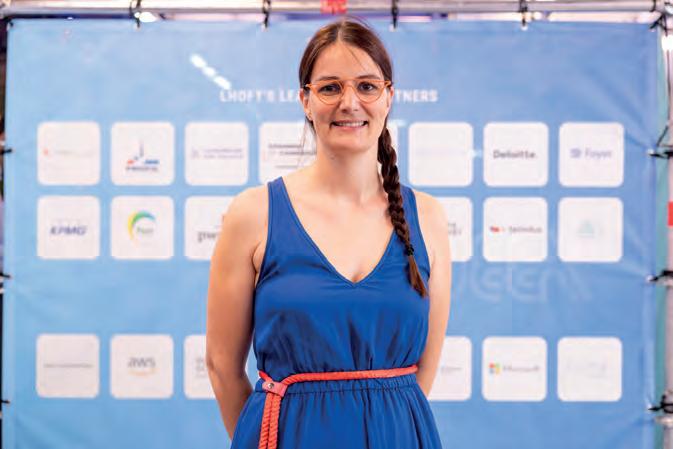
What role can DLT play in achieving the sustainable development goals?
There is currently a lot of activity in the field of sustainable finance. Many solutions exist without the use of DLT, and it is not necessary to use it systematically. But DLT is an invaluable tool that helps to avoid greenwashing by ensuring that the information provided, in particular the labelling of investments, is reliable. In this way, we can ensure that the data as extracted is correct right up to the moment it reaches the hands of the citizen or the financial institution that has to make an investment decision.
If the data is no good from the outset, DLT won’t change a thing. This is where the combination with other technologies becomes interesting. With the
Internet of Things, for example, we can use sensors to accurately measure greenhouse gas emissions throughout the production cycle. The data captured by the sensors is then immutably recorded in the blockchain. In this way, they reflect actual emissions rather than estimates.

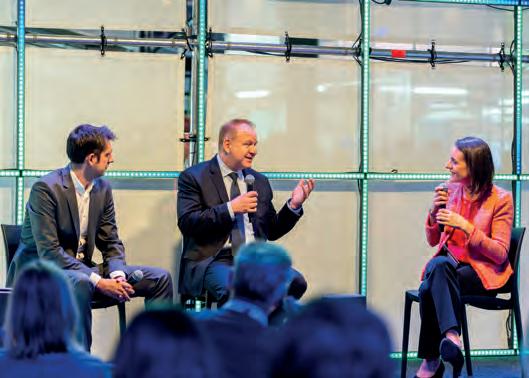

1 Nick Ashton (HSBC Luxembourg), Geoffrey Dezoppy (Avaloq), Roger Kramer (Spuerkeess), Ananda Kautz (ABBL)
2 Romain Swertvaeger (EY), Thomas Moser (Swiss National Bank), Biba Homsy (Homsy Legal)
3 Antoine Leblais (Deputy CISO of Foyer Group)
4 Ethan Pierse (Borderless Ventures), David Ford (Silverpeak LLP), David Shrier (Visionary Future LLC), David Dana (EIF), Adam Niewinski (OTB Ventures), Pierre Festal (Promus Ventures)
5 Patrice Witz (PwC Luxembourg), Sébastien Respaut (Microsoft Luxembourg)
6 François Dupont (Sage)











7 Chris Hollifield (LFF), Douglas L. Feagin (Antv International)
8 Patrick Stäuble (Teylor AG) , Laurent Hengesch (Ilavska Vuillermoz Capital)
9 Nicoletta Centofanti (LSFI), Julien Froumouth (ABBL), Anne Calteux (European Commission), Tiago Freire de Andrade (Lynxai)
10 Atthakrit Chimplapibul (BitKub), Ami Nagata (bitFlyer), Solenne Niedercorn-Desouches (Gokyo), Ethan Pierse (Borderless Ventures), Kevin Riou (Swissquote Bank)
11 Amélie Madinier (Le Village by CA Luxembourg), Adina Grigoriu (Active Asset Allocation), Tanguy Polet (Swiss Life France), Marie-Hélène Massard (Foyer Group)
12 Isadora Pardo (ALFI), Roberto Petrarulo (Clearstream), Julien Wolff (6 Monks), Hubert Grignon Dumoulin (CACEIS), Mindaugas Miskinis (Fireblocks)
13 Lars Weber (Spuerkeess), Jérôme Duchêne (Schroders), Jean-Louis Schiltz (SCHILTZ & SCHILTZ)
14 Pascal Morosini (i-hub)
Nexus2050 was a remarkable gathering that united experts, thought leaders, and innovators. An invaluable opportunity for attendees to engage in meaningful discussions, debates, and knowledge-sharing sessions. In this article, Deloitte will share 7 lessons learned with the wider public. From network and scalability strategy to trust and infrastructure, discover which strategies to consider as you lead your organization through AI adoption.
1. NOT JUST NODES: NETWORK IS CRITICAL FOR DEVELOPMENT
When it comes to navigating novel technological landscapes, who you have in your network and feedback loop is key. At Deloitte, we’re dedicated to developing use cases for our clients; but we are able to do this through our exchange with core partners that include AWS, NVIDIA, Google, LuxProvide, SAP, Salesforce and LHoFT. By generously sharing knowledge and experiences, we can learn and innovate more rapidly.
For instance, only through this network were we able to exchange valuable insights on building and utilizing AI across various domains. We addressed CRM adoption of AI with Salesforce; HR and Finance use case development with SAP; Data querying solutions using Generative AI (GenAI) with Google and powerful NVIDIA-based models for managing company operations and t voicecontrolled drones with AWS. In return, we shared our own advancements in the safe adoption of AI, lessons on customizing AI models with retrieval augmented generation systems (RAGs), and fine-tuning models to build AI agents. All of this knowledge was exchanged within the 30 sqm of Deloitte’s booth over just two days. But none of this
would have been possible if we were working in a vacuum; your network is key.
2. SCALING: IDENTIFYING AND ADDRESSING SPECIFIC CHALLENGES IS KEY
For the past decade, AI developments within organizations often stayed in the background— powering growth for some while marking careful explorations for others. Many projects remained in the minimum viable products (MVPs) or proof of concept (PoC) stages. This mindset influenced decisions on tools, timelines, and technology stacks, often leading to solutions that were hard to scale.
The recent boom in AI, however, has enabled faster development and value extraction. Large language models (LLMs) have garnered significant attention, prompting us to rethink our approach to AI and expanding its potential use cases. That said, according to the Deloitte Generative AI Enterprise Report (Q3), nearly 70% of respondents indicated their organization has moved 30% or fewer of their GenAI experiments into production, and scaling those AI development has proven challenging, especially for those that started on the wrong trajectory.
Through sharing our own project experiences, experts confirmed that naming
the specific challenges and finding the specific solution will be key to effectively scaling. This includes identifying your ideal: generative platform, cloud solutions, and strengthening your model a and adoption strategies. It is often through identifying and addressing these smaller pieces that can lead to a potential for scaling.
3. ESSENTIAL BEST PRACTICES: BUILDING TRUST IS CRITICAL FOR WIDESPREAD ADOPTION
Building trust in GenAI is essential for its widespread adoption. To achieve this, it is critical to adhere to several best practices.
Verification: Always ensure rigorous fact-checking to validate the accuracy and reliability of AI-generated outputs. This step mitigates the risk of dispersing incorrect information, thereby maintaining credibility. To this point, it’s advisable to use GenAI within your field of expertise. Having domain-specific knowledge enables users to better identify and address biases or hallucinations in AI outputs, ensuring its accurate and effective application.
Transparency: Clearly communicate to stakeholders how AI systems operate and what they are intended to achieve. This
openness builds confidence by reassuring them that the technology is designed to augment human capabilities rather than replace them.
Ethical practices: It is critical to enforce guidelines that emphasize fairness, accountability, and inclusivity. Following these ethical standards not only ensures compliance with regulations but also fosters a trustworthy environment for AI deployment.
Continuous improvement protocols: User feedback is crucial to iteration. Engaging with users to gather insights and experiences helps refine and enhance your AI systems over time. Demonstrating this commitment to tailoring the technology to user preferences shows your dedication to building a tool for them, further solidifying their trust in the system.
Generative AI's full potential can only be realized through widespread AI literacy across all organizational levels. In a market that has become increasingly competitive for AI talent, organizations have been aggressively pursuing new hires but are also focusing on training their existing workforce. But it is important to note that this effort to maximize the value of AI will require empowering teams with not only the skills they need to be confident but the freedom to experiment. This approach will ensure that employees are leveraging AI tools effectively.
5. EMERGING AND FUTURE PROSPECTS: THE BOOM’S BENEFITS HAVE ONLY JUST BEGUN
Some organizations are already experiencing the benefits of Gen AI and anticipate further advantages in the future. According to Deloitte's State of Generative AI in Enterprise Report (Q2) 2024, summarizing a survey of 1,982 director- to C-suite-level respondents across six industries and six countries conducted between January and February 2024, 27% of organizations currently report improved efficiency and productivity, while 56% expect additional benefits down the line. Furthermore, 28% note that GenAI models enhance existing products, and 22% state that the adoption of Generative AI has enabled their workers to transition from low-value to high-value tasks; an additional 26% expect this benefit to grow. Overall, it is fair to summarize that extracting value from GenAI has already yielded significant advantages, with more expected to come. we expect that this pace will continue across data science and various
industries over the next few years, achieving new capabilities and wider adoption
6. COMPUTATIONAL POWER: CUSTOM AND HYBRID SOLUTIONS ARE THE NEXT STEP IN ENTERPRISE ARCHITECTURE
Computational power is derived from hardware that is managed by software; together they enable massive AI models to run effectively. The recent surge in attention towards AI, particularly those driven by large language models (LLMs), is largely due to the models’ scale. This scale has been made possible through efficient advancements in hardware production and the massive expansion of high-computing platforms. For many companies thus far, this has always led to a fundamental dilemma: Should they opt for cloud-based solutions or build on-premises infrastructure? Both options have pros and cons to be considered in terms of scalability, capability, security, or control. Luckily, as hybrid and alternative approaches enter the market, levering computational power in new ways make the need to choose between one or the other increasingly diversified. Consider local cloud solutions and sovereign supercomputing offerings, for example. As the market develops, organizations will have increasingly diverse and customizable options when it comes to harnessing the enabling power needed for AI. This shift allows us to envision an AI evolution that isn’t confined to a binary decision, but instead flexes computational resources in a way that best meets an organization’s specific needs and goals.
7. MITIGATING RISK: BROADER IMPLEMENTATION OF INTERVENTIONS IS NEEDED TO ADDRESS CONCERNS
According to Deloitte survey respondents, three of the top four barriers to the successful development and deployment of GenAI tools go beyond the more obvious challenges of implementation, adoption strategies, and difficulty identifying use cases. Instead, the top three concerns are driven by the new risks that are specific to these tools: model bias and hallucinations; privacy concerns and trust issues; and protecting new attack surfaces. Consequently, only 23% of organizations feel highly prepared for the challenges GenAI poses to their risk management and governance. As GenAI moves from small-scale pilots to large-scale deployments, managing risks will become crucial, as evidenced by respondents identifying effective risk management as the second-most important factor for driving value in their GenAI initiatives. To build trust and ensure responsible
use, some of the organizations survey are establishing governance frameworks (51%), monitoring regulatory compliance (49%), and conducting internal audits and testing (43%). However, over half of the respondents have not yet implemented any intervention.
Despite AI advancements, nearly 70% of organizations have moved only 30% or fewer of their Gen AI experiments into production, facing scaling challenges. Building trust in AI is crucial. We look forward to implementing the insights proposed in this article in our client support strategies, and we eagerly anticipate next year's event.
AUTHORS: NICOLAS GRIEDLICH
Partner,
Artificial Intelligence & Data
ANKE JOUBERT Senior Manager,
Artificial Intelligence & Data
LIUBOMYR BREGMAN Senior Manager, Artificial Intelligence & Data
The PureTech Stage at Nexus2050 showcased discussions on cutting-edge technologies and innovations, including advancements in artificial intelligence, cybersecurity strategies, blockchain applications, and the future of quantum computing. Prominent tech industry leaders, researchers, and innovators shared their insights and experiences. The stage explored the intersection of technology with various sectors, highlighting real-world applications and future trends. Lara-Sophie Bothur and Leo Sharma, Masters of Ceremony, expertly led the sessions, ensuring engaging and insightful discussions throughout the event.


Written by IOANNA SCHIMIZZI
Photo DANIEL KAHN/ARCHIVES
While many Luxembourg companies dream of expanding into the United States or Asia, lawyer and entrepreneur Daniel Kahn, founder of Red Bridge, warned them not to rush into developing their product on the European market first during the Nexus2050 technology conference.
During a keynote address at Nexus2050 on Wednesday 26 June on international market opportunities for Luxembourg companies, you stressed the need not to rush into anything.
Yes, you don’t go to the United States, Asia or the Middle East if you’re not ready. The product has to be finished, there have to be customers, repeat customers, you don’t go international with cobbled-together products. If you’re looking to sell a product, you need to look at the country or zone where there is the greatest demand for the product, and where there isn’t too much competition, or at least where you think you’re better than the competition.
Is there potential for Luxembourg companies?
Of course, and you don’t go abroad just to sell a product, but also to find additional investors or partners. And depending on your motivation and the market, i’’s in your interest to go to a particular area.
Are there certain sectors where Luxembourg has a better chance of developing internationally?
Space, a sector in which the country has many companies, since it was a priority

sector for the previous government. Clearly, they are going to have to expand internationally, as Luxembourg is not a big enough market for them to develop. We also have a real strength in fintech and insurtech, and there are real areas to develop internationally, including cybersecurity.
But before attacking Asia, the United States or the Middle East, you first need to develop in Europe?
Most of the time, yes. It’s better to already have a presence in several European countries, because it’s a lot simpler and it.s right next door. And then you expand out of Europe.
Written by LÉNA FERNANDES
Photo MAISON MODERNE
Lubomila Jordanova and Bouchra Kidah, two women at the head of technology companies that help businesses to become more environmentally responsible, took the floor of Nexus2050 PureTech Stage to talk about how they have built their respective businesses.
The CEO and founder of Plan A, a provider of solutions and expertise for decarbonising businesses, first became aware of the comfort of her daily life in London and her work in the world of finance, when she took part in a rubbish collection on a beach, she said at Nexus2050 on Wednesday 26 June. After this “reality check”, Lubomila
Jordanova left everything behind to embark on a new path, focused on sustainability. At UFO² Consulting, a business consultancy, managing partner Bouchra Kidah explained that their work on the environmental impact of companies began with an internal reflection.
Jordanova said she realised that, thanks to the data, a real “correlation between economic stability and our way of understanding nature” could be made. She also believes that to have a real impact on businesses, we need to talk to them “about what is happening today, not in 50 years’ time”, and about how taking environmental issues into account can “support a company’s economic value”. And “that’s where we arouse the interest of CEOs and other managers”. Kidah is well aware of this as a company director, because before

offering green IT consultancy services, she took action within UFO² itself: “We started with small things, like limiting printing and recycling, integrating electric models into our fleet of cars... Then we thought about our own business, what we offer our customers and the environmental impact of our activity. So we defined a new strategy that took account of this issue, while maintaining our objective of profitability.”
A number of observations were made: “We didn’t have enough data at our disposal to train our artificial intelligence models, so we decided to collect and consolidate the data ourselves. The idea is then to share our findings, to democratise the subject of sustainability in business.”
Assessing every aspect of the business
By offering software that automates the calculation of CO2 emissions, plans their reduction and helps with ESG reporting, Plan A enables companies to “put a tangible figure behind each of their structures”. Jordanova cites the fast-food chain KFC, for whom she has worked for several years, as an example of a client. “For them, we process millions of pieces of data every month in order to find solutions to help them reduce their emissions. We also invite all their suppliers and stakeholders to take an interest in the subject.”
Written by MAËLLE HAMMA
On the second day of Nexus2050, Thursday 27 June, a panel was devoted to the potential pitfalls of artificial intelligence and deepfakes. Often associated with risks and misinformation, deepfakes also present advantages and can be a business opportunity, provided certain conditions are met.
Djamila Aouada, head of the computer vision, imaging and machine intelligence (CVI2) research group at the Interdisciplinary Centre for Security, Reliability and Trust (SNT), also sees a promising side, provided that its use is well thought out, and an excellent source of creativity. “One example is Synthesia, which was created by researchers and allows you to create avatars. They’re fakes, but the tool can be used to avoid having to create all the content and be more efficient. It saves effort and money. These tools are increasingly used by Youtubers, who can produce videos without having to worry about all the technical aspects such as lighting, filming, the language used, etc.” The technique could also be adopted to a lesser extent in businesses, according to Bergeron. “Let’s imagine we take a company that makes videos for its customers, customers who are international. The person giving the presentation will do so in their native language--French, English, whatever. With deepfakes, we can multiply the same interview by synthesising the person’s voice in another language, changing the setting or whatever. So these are positive impacts. We can really get much closer to

customers by changing the language in which we interact with them, for example,” he says.
The challenge: knowing how to detect But there remains a major challenge: knowing how to detect them. This is something that everyone can do in many cases. According to Aouada, the first thing to look for is the faults in the faked multimedia content, which most often takes the form of a video. “Synchronisation can lead to spatial defects at a given time. These can be seen, for example, in the contours of the face, at the level of its delineation. There are also often temporal defects, or lips and voice that are not synchronised. But those who create deepfakes sometimes play on the resolution of the data, which they pixelate so that these
faults are less perceptible. The better the quality of a deepfake, the more difficult it is obviously to spot these faults,” explains Aouada, who draws a distinction between “cheapfakes,” or poor quality deepfakes, and “high-quality deepfakes,” often based on well-known people. “This is evolving very quickly and we, as users, will find it increasingly difficult to detect them.”

KEYNOTE : Managing Scale of GenAI Through Trust by Joakim Wahlqvist (CTO Data & AI - Sogeti Global)
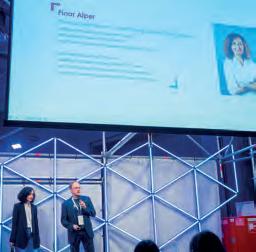
KEYNOTE : FAIR Data Stewardship: Making Data AI-Ready by Pinar Alper (Principal Data Steward - LNDS) and Bert Verdonck (CEO - LNDS)

PANEL : Data-driven business models : innovation and transformation
With the participation of Mamoun Benkirane (CEO –MarketLeap), Romain Hansen (Vice President, EMEA Product Development - Goodyear Tire & Rubber Company), Imeshi Weerasinghe (CEO and Co-founder at WEO), Alda Sawaya (RVP Financial Services - Dataiku)

KEYNOTE:
The impact of AI on the corporate world by Nicolas Griedlich (Partner AI & Data - Deloitte) and Giulia Pescatore (Senior Manager Innovation - Deloitte)

KEYNOTE : Data, the fuel of IT eco-system by Nagarjuna Reddy (Senior Lead, Data Architecture - Kyndryl)

KEYNOTE : Igniting the future with GenAI by Nathan Poelman (Generative AI GTM – Google)
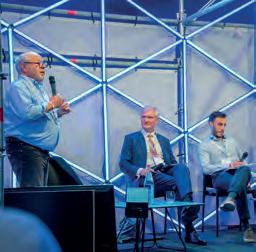
PANEL : How to reach a new international market from Luxembourg
With the participation of Marjorie Hamelin (Founder & CEOUS Outreach), Edouard Leonet (Head of Partnerships, Asia-Pacific Region - Acclime), Brice Lecat (CEO/Founder - Xpand Advisors) Moderated by Daniel Kahn (CEO, International Business Strategist, and Tech Advisor - Red Bridge)

PANEL : AI Champions
With the participation of Ajay Bali (Partner – EY) and Joakim Wahlqvist (CTO Data & AISogeti Global)

KEYNOTE:
How to unlock ROAI? by Stéphanie Griffiths (Field CDO - Dataiku)

PANEL : The data-driven value chain : creating new ecosystems
With the participation of Michael Mossal (Director Digital Transformation - Group CTO Office at NTT Ltd.), Jasmin Schulz (Strategic Programme Lead - Luxembourg Institute of Health), Bert Verdonck (CEO - LNDS), Gregory Nain (Co-Founder – DataThings) Moderated by David Foy (Head of Sector Development)

KEYNOTE : Fostering Innovation and Embracing New Technologies in an Ever-Changing World by Bjorn Tremmerie (Head of Technology Investments - EIF, the European Investment Fund)

KEYNOTE : Revolutionizing Business Models Through Cutting-Edge Technologies by Wincho Bacuna (Senior B2B Trainer - Samsung Electronics Benelux)

KEYNOTE : The Challenge of Generative Artificial Intelligence by Patrick Buchholz (Cybereason)

OPENING WORDS :
Introduction: Empowering Sovereignty: High-Performance Computing and the Future of Data Infrastructure by Paul Konsbruck (CEO - LuxConnect)

KEYNOTE : Debunking three common myths about cybersecurity by Sergio Alves Domingues (CTO - Orange Cyberdefense Switzerland)
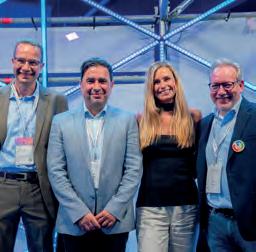
PANEL : How can HPC enhance data sovereignty in the evolving landscape of digital infrastructure ?
With the participation of Pascal Rogiest (General Manager – Clarence), Filipe Pais (CCSO - LuxProvide), Kurt Rommens (Head of seector Benelux - Google Cloud Public)Moderated by Lara Sophie Bothur (Corporate Tech Influencer - Deloitte & Voice for Innovation in Europe)


Conclusion: Empowering Sovereignty: HighPerformance Computing and the Future of Data Infrastructure by Arnaud Lambert (CEO - LuxProvide)

PANEL :
Data governance, regulation, and sovereignty
With the participation of Jérôme Dierickx (Managing Directors - Terra Matters), Eric Brier (Vice President, Chief Technology Officer Cyber Digital SolutionsThales), Vanessa Butera (Director Data and information - European Investment Bank), Jolanda van Eijndthoven (Head of Directorate General for Defence Industry and Space (DEFIS) - European Commission) Moderated by Ralf Hustadt (Luxinnovation GIE)
by Startup Luxembourg
Association: Legal Toolkit : what’s in it for founders and entrepreneurs by Patrick Kersten (Chairman, Co-founder – Startups.lu)
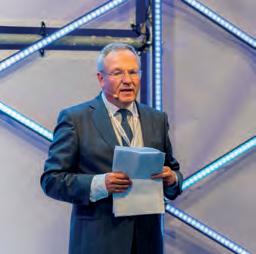
KEYNOTE :
InvestEU – support for start-ups and SMEs by Michael Feith (Directorate General Economic and Financial Affairs, InvestEU Investment Committee Secretariat - European Commission)
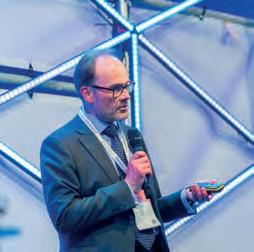
KEYNOTE :
The EU AI Strategy : Excellence - Trust –International by Juha Heikkila (Adviser for Artificial Intelligence –European Commission)

SCHEMES TODAY :
How to implement a ESOP scheme to attract to retain talent by Xavier Buck (Entrepreneur, Founder & Chairman - Namespace Group)
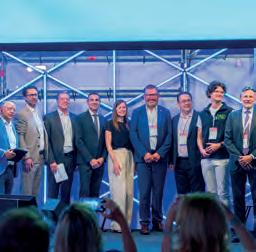
With the participation of Daniel Liebermann (Ministry of the Economy), Olivier Vassart (ArcelorMittal), Artyom Yukhin (Artec Europe), Frank Thomé (Ceratizit Group), Julius Müller (Circu Li-ion), Julie Mouzon (Circuit Foil Luxembourg), François Cordier (Leko Labs), Paul Griffith (Michelman International), Andrea Scammacca (B Medical Systems), Marc Jacobs (Molcular Plasma Group), and Benoit Henckes (United Caps Wiltz) Moderated by Pedro Castilho (Verbalius)

PANEL :
AI Risks Unveiled : Deepfakes, Content Integrity, and Beyond
With the participation of Djamila Aouada (Head of the Computer Vision, Imaging and Machine Intelligence (CVI2) Research Group - SnT, University of Luxembourg), Michael Keugsen (CEO - Ella Media AG), Juha Heikkila (Adviser for Artificial Intelligence – European Commission), Loris Bergeron (Sr. Software EngineerBanque de Luxembourg) Moderated by Maxime Dehaut (AI Evangelist, Head of IT Architecture - CFL)

KEYNOTE :
Cloud, AI, and CybersecurityThe Essential Alliance in Our Digital World by Ludovic Gilles (CEO - Elgon/POST Group)

Generative AI offers unprecedented opportunities to transform software and quality development. Bringing together our passion for quality and our drive to create the best value from existing and future technology, our Gen AI Amplifier is ready to optimize end-to-end quality engineering within your software creation and modernization journey.

KEYNOTE :
Strategies in Cloud Computing: Ensuring Compliance and Fostering Innovation by Ivo Haagen (Azure Cloud Evangelist, Cegeka for NSI Luxembourg)

PANEL:
AI in OrganizationsHybrid Approach, Scalability Challenges
With the participation of Dr. Jochen Papenbrock (Head of Financial Technology
EMEA - NVIDIA), Jean Pierre Le Goaller (Cloud Solutions Architecture Leader - Amazon Web Services), Razvan-Petru Radu (Deputy Head of UnitOP Portal - Publications Office of the EU) Moderated by Liubomyr Bregman (Senior Manager in AI & Data - Deloitte Luxembourg)
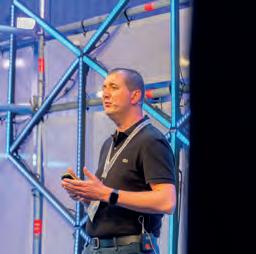
KEYNOTE :
Mitigating AI biases, testing AI, Ai sandboxes by Francesco Ferrero (Director of the ITIS Department - Luxembourg Institute of Science and Technology - LIST)

KEYNOTE :
How emerging technology enhance project delivery?
Louis-Philippe Cardoso (Senior Manager - Deloitte)

PANEL :
The real world : AI applications and challenges
With the participation of Anne Goujon (Head of Data Science Lab - BGL BNP Paribas), Nathan Poelman (Generative AI GTMGoogle), Alastair Masson (Head of Telco and Enterprise - Quantexa Ltd) Moderated by Steve Muller (Ministry of Economy)

KEYNOTE :
Low-Code Platforms : The Bridge to the Future of Software Development by Jean François Lecomte (Innovation & Solution Manager - Low Code Application Platforms – CBTW) and Olivier Della Maggiore (Innovation Leader – CBTW)

KEYNOTE :
Generative AI: A reality check! And why we believe it is here to stay
Anke Joubert (Senior Manager, AI & DataDeloitte Luxembourg)

CIO INSIGHTS :
Maximizing Value : What CIOs Should Expect from Tech Suppliers
With the participation of Laurent Couturier (CIOArmacel), Laurent Pullincx (CIO - Luxembourg Stock Exchange) and Remy Els (CIO - Foyer Group)
Moderated by Daniel Mathieu (CIO - CFL)
Welcome to the world of what’s possible with Generative AI - our GenAI Business Center, powered by Microsoft technologies. A hub for innovation and transformation
Our GenAI Business Center is designed to be a stateof-the-art hub for innovation, highlighting how the integration of PwC’s industry expertise with Microsoft’s advanced AI solutions can address complex business challenges, and unlock new opportunities.
The GenAI Business Center explores how to:
• Elevate your core business using Azure OpenAI Services, Azure Cognitive Services, Azure AI Studio, or Microsoft Fabric;
• Increase your productivity using Microsoft 365 Copilot, Microsoft Dynamics 365 Sales Copilot, as well as Copilot for Finance;
• Rapidly innovate business cases using the Copilot Studio and the GenAI-enabled Power Platform.
Contact us today to learn more about the GenAI Business Center, our immersion sessions and how we can help your organisation make the most of GenAI’s potential.



Patrice Witz
Advisory Partner, Technology Partner and Digital Leader, PwC Luxembourg
+352 621 333 533
patrice.witz@pwc.lu
Grégory Weber
Managing Director, Experience Center Leader, PwC Luxembourg
+352 621 336 175
gregory.weber@pwc.lu
Andreas Braun
Advisory Director, AI & AI Lab Leader, PwC Luxembourg
+352 621 332 366
andreas.braun@pwc.lu

Minister for Higher Education and Research of Luxembourg,

Meagan Loyst led a series of engaging discussions exploring the future of technology and innovation. Highlights included a focus on the role of women in tech, cutting-edge advancements in military and cyber technologies, and strategic IT partnerships in times of crisis. The stage also featured insights into financing women entrepreneurs, the evolving landscape of AI and cybersecurity, and the latest in decentralized technologies. Attendees gained perspectives on scaling net zero technologies, smart city innovations, and managing talent in an AI-driven world, while also delving into Ukraine’s digital strides in GovTech and FinTech.
Written by CÉLINE COUBRAY Photo PAPERJAM
As part Nexus2050, organised at Luxexpo, presentations and a roundtable discussion were held on the theme of the Smart City on Thursday. It was an opportunity to discover cutting-edge projects on this theme.
Today, the Smart City mainly involves the development of digital twins. These digital twins can be fed with a wealth of information to manage and anticipate certain elements, such as traffic or water levels. This is possible thanks to the relay of connected objects and sensors, but also thanks to a whole range of different sources of information that can enrich the analyses (such as meteorological data in the case of water levels).
The importance of integrating a network Erik Mannens, from imec UAntwerp ID Lab, explained that the digital twin approach has evolved in recent years: from an isolated digital twin to a digital twin with the integration of international partners and models. “To be more effective, a digital twin must be able to integrate into a network and not respond solely to local intelligence,” he said during his speech on the Nexus2050 stage. “But this requires a framework for such exchanges, including a secure data space so that the various partners and stakeholders in the project can deposit their data in complete confidence.”
The ultimate aim is to create local digital twins based on a European toolbox (Open Local Digital Twin). These OLDTs will represent the built environment and its environmental impact, with the primary aim of providing the tools and data needed to make decisions at both opera-

tional and strategic levels, based on tangible data. These decisions may concern a number of different areas, including transport, energy, the environment or town and country planning.
If we focus on the field of transport, and more specifically the management of automobile traffic, Qatar has developed a fine example. To meet the needs of the 2022 football World Cup, the Qatar Mobility Innovations Center has set up “a real-time car flow management system, linked to the parking offer, to enable football fans to attend as many matches as possible each day and thus avoid traffic jams,” said Hamid Menouar from QMIC. Using sensors and a platform incorporating artificial intelligence, traffic can be optimised, particularly at traffic lights, and motorists informed in real time of parking availability, enabling them to choose the best option without creating a traffic jam to park their car.
“The time to act is now”
Written by PIERRE THÉOBALD
For lawyer Guy Castegnaro, employers need to get a grip on AI and its uses--because the risks are real.
“AI tools are becoming increasingly common in the workplace, impacting everything from recruitment to dismissal,” said employment lawyer Guy Castegnaro at a keynote speech delivered as part of the tech conference Nexus2050 at Luxexpo The Box. In recruitment, said the lawyer, AI systems can write job descriptions; candidates can use a chatbot when submitting their application; and AI systems can sort and pre-select CVs. In performance management, he went on, algorithms can make comparisons, detect opportunities for improvement and efficiency, and even generate a performance evaluation. And in terms of monitoring, AI systems “can track employees for health and safety reasons,” said the lawyer, such as for taxi drivers, “but also for efficiency reasons.”
Castegnaro, who two decades ago founded the employment law firm that bears his name, warned that these uses are not without risk for employers. The AI Act adopted by the European Council last May identifies four layers of risk--unacceptable, high, limited and minimal--and, applying these to the world of work, Castegnaro classifies AI systems used for recruitment and selection, as well as those that make decisions that affect the employment relationship, as “high risk.” The resulting obligations are numerous: “The employer must

use the AI system in accordance with the system developer’s instructions; designate a person to oversee the AI system who is trained, competent and has the necessary support and authority; ensure that the input data over which it has control is relevant and sufficiently representative; monitor the AI system in accordance with the supplier’s instructions; report incidents to the supplier; inform and consult and, in some cases, seek the authorisation of employee representatives before implementing an AI system.”
“In some cases,” he added, “the employer
must carry out a fundamental rights impact assessment before using an AI system, for example if it is a public body providing a public service or if it operates in the banking and insurance sector.”
Written by CÉLINE COUBRAY Photo GOODBYTZ
We learned a little more about the role of robots in the food industry at the Nexus2050 tech conference on Wednesday 26 June at Luxexpo The Box. Kevin Deutmarg, co-founder of GoodBytz, which offers robotic kitchen systems, explained how the system works in an interview.
Robots are used for a wide range of tasks in the food industry. They can be found in the fields planting, weeding, harvesting or scarifying, and then in tasks linked to sorting, packaging, palletising, as well as in order picking and quality control. Equipped with artificial intelligence and artificial vision systems, they are even capable of carrying out delicate tasks requiring great precision, such as decorating cakes for the patisserie.At the Nexus2050 trade fair dedicated to new technologies, Goodbytz presented an innovative system for preparing ready-made meals using an automated system and a robotic arm. “We set up our company in Germany two years ago, at a time when the catering and hotel sectors were feeling the full impact of the covid crisis and difficulties in recruiting staff,” explains Kevin Deutmarg, co-founder of Goodbytz. “We were also aware of the new trends in healthy eating, mainly based on plantbased ingredients, and of consumers’ desire for greater flexibility in mealtimes. But these trends were out of step with the food industry and restaurant offerings. That’s why we invented a system that takes the pressure off chefs, which can be activated 24 hours a day, on demand, while still producing high-quality food.”
Complete production unit Goodbytz is developing an intelligent, complete system that combines several auto-

mated tasks in a single production unit, from assembling ingredients to cooking, packaging and even cleaning utensils.
“Chefs enter their recipes into our system, specifying ingredients, quantities and cooking levels, and the production unit does the rest,” explains Deutmarg.
Different configurations are possible to meet a variety of needs: a station for cooking pasta, salads or Asian dishes... Many recipes are possible, including breakfast dishes.
“A crucial stage for us was the full-scale test with the creation of a ‘ghost kitchen.’ We invented a restaurant brand that offered delivery. At no point did we specify that the dishes were prepared by a robot. And after just a few months in operation, we made it into the top 15% of restaurants rated by consumers in Germany. And over 35% of our customers ordered from us at least once a week.”
Written by PIERRE THÉOBALD Photo MAISON MODERNE
Active in some fifty countries, the global organisation Women in Tech, which was invited to Nexus2050 at Luxexpo The Box on Wednesday, is now active in Luxembourg. Its ambition is to break down stereotypes and encourage more women to take up careers in tech.
“There’s still a lot of work to be done... I’ve been in business for many years, so we know we’re having an impact. But the statistics don’t change.” Founder and managing director of Wide Andco Marina Andrieu laments the fact that year after year, changes in attitudes do nothing to change the fact that women remain under-represented in tech. Not that women are losing interest. On the contrary,
“girls come to the activities we offer, they really enjoy what they do, but it’s when it comes to choosing a course of study that it all comes down to it,” she continues. There are many persistent obstacles that are present from an early age.
“Unfortunately, children know very well what a girl’s role is and what a boy’s role is in society. Education is very gendered. These are messages that are quickly integrated. I have a daughter. At the age of 2, she knew that she was a girl, that her mum was a girl, and so on. By the age of 2 and a half, she knew what a girl’s toy was and what a boy’s toy was... Early childhood is where it’s all about. Ultimately, we’re too late. But there is room for manoeuvre, and that’s what we need to explore,” says Andrieu.
“The fairly relevant example in Luxembourg is a young girl who is doing well in science and is advised to go into medicine. IT is not one of the career options on offer.

We need to tell parents, even the most educated ones, that their daughter could become the next Mark Zuckerberg,” asserts Andrieu, who tirelessly preaches the good word at events and did so again on 26 June at an invigorating roundtable.
“Energising the country”
The Women in Tech organisation, which already has a presence in some fifty countries, now intends to carry out this awareness-raising mission in Luxembourg, where it has just started its activities. “The idea is to energise the country on this issue and highlight all the initiatives being taken at local level,” explains country director Zineb Bensaid, who is also founder and CKO of Dealfox, a company specialising in finding investment opportunities. Bensaid works hand in hand with CEO Ayumi Moore Aoki, founder of Women in Tech Global, the international leadership structure.
Written by CÉLINE COUBRAY Photo PAPERJAM.LU
Aaron E. Walsh, director of the Immersive Education Initiative and the Knowledge Foundation, spoke at Nexus2050 on Thursday. He presented the role of immersive universes in the field of education and its development towards tokenisation.
Virtual reality headsets have been used for educational purposes for almost 20 years now. More often than not, it is augmented reality or virtual reality that is used for educational purposes. “The latest helmets can even be used to combine the two”, explained Aaron E. Walsh. “At the end of the sessions with these digital tools, the children would often ask us ‘What’s my score?’ And we’d have to explain to them that we thought it was great that they’d had fun learning, but that it wasn’t a ‘real’ game and so there was no score.”
Ease of use
Today’s digital renderings are so much more realistic that it is sometimes impossible to distinguish between a real image and a digital rendering. Sound can be spatialised, and body movements reproduced in the virtual world, including walking on a specially designed mat.Artificial intelligence can be coupled to these tools, giving them a higher level of complexity and elaboration. “Artificial intelligence has also greatly democratised the production of virtual reality. What used to take a week to make can now be done in a few minutes by AI, opening up new possibilities for educational tools. All these technological advances mean that digital worlds are

becoming increasingly realistic, plunging users into immersive worlds that are very close to reality. For students, virtual worlds are therefore increasingly similar to what they might experience in real life.”
Earning tokens as you learn
The idea of earning tokens while learning has also gained ground. “Why not earn tokens when a student reaches a certain level of knowledge? They could then convert these tokens to continue a course of paid study, go to university or buy basic necessities for themselves or their families. This could be a solution for children living in poverty who don’t have the opportunity to go to school because they have to work to support the family.”
A partnership is currently being set up with the United Nations on this subject, and hackathons are being organised in various parts of the world to develop the solutions that would enable this system to be put in place. Stay tuned.

PANEL : Women & Tech
With the participation of Ayumi Moore Aoki (Founder and CEO – WOMEN IN TECH), Véronique Ziliotto (Founder – ellan) Moderated by Marina Andrieu (Managing Director - WIDE ANDCO)

PANEL : IT Partnerships Between Businesses and Non-Profits in Times of Crises
With the participation of Maryna Saprykina (CEO - CSR Ukraine), Emin Allagui (Senior Specialist in Business Development – SES Satellites) Moderated by Nancy Thomas (Director – IMS)

PANEL : Women & Financial investments
With the participation of Stefania Quaini (Managing DirectorAngels4Women (A4W)), Lisa-Marie Fassl (Managing Partner - Fund F), Ouma Sani (Manager and Trainer - Women’s Investment Club Senegal) Moderated by Marina Andrieu (Managing Director – WIDE ANDCO)
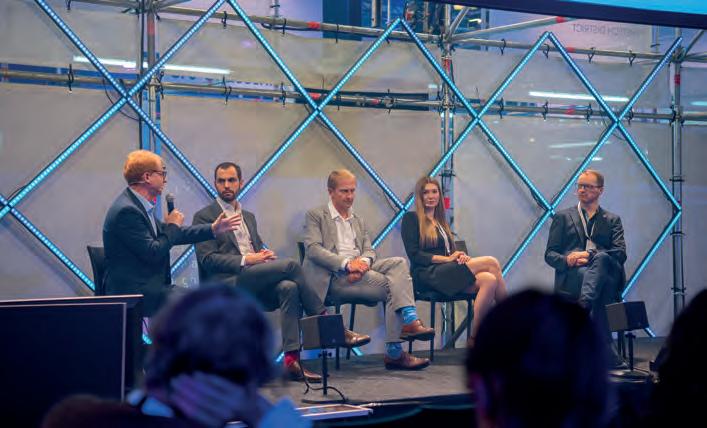

KEYNOTE : AI & Cybersecurity –navigating a doubleedged relationship by Pascal Steichen (Luxembourg House of Cybersecurity)
PANEL : Cybersecurity and Technological Innovation
With the participation of Peter Kerstens (Advisor for Technological Innovation, Digital Transformation and CybersecurityEuropean Commission), Sylvain Hajri (Expert in Open Source Intelligence, Founder and CEO – Epieos), Guy-Philippe Goldstein (Strategic Advisor, Consultant, Teacher and Novelist), Nataliia Iskra (Director - Head of Security IT at Clearstream – Deutsche Börse) Moderated by Pascal Steichen (Luxembourg House of Cybersecurity)
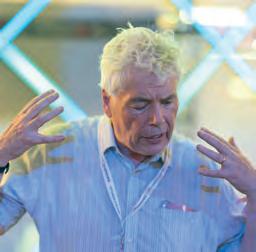
KEYNOTE :
Building trust through technology by Bill Roscoe (DirectorUniversity College Oxford Blockchain Research Centre)

KEYNOTE :
Scaling up Net Zero Tech: the EU’s Strategy by Merete Clausen (DG GROW - Director for InvestmentEuropean Commission)
Fostering Female Talent In Fintech by The LHoFT, The Luxembourg Tech School & The National Research Fund
With the participation of Mireille Adjaouté, Aleksandra Amroune, Hinde Baddou, Patricia Becerra, Luisa Bertoldi, Hannah Boughton, Tanya Endshpill, Natalia Jurado, Yukari Kato, Mara Kroth, Moc-Yung
Le-Tu, Diwei Liu, Hashini Liyanage, Megan Molitor, Cecile Nivlet, Clar

From Dubai to Luxembourg: When two women entrepreneurs connect by Djémaia Badji (CEO Owner - BDA Global Services) and Axelle Bonnemaison (Property Consultant - businesslifedubai)
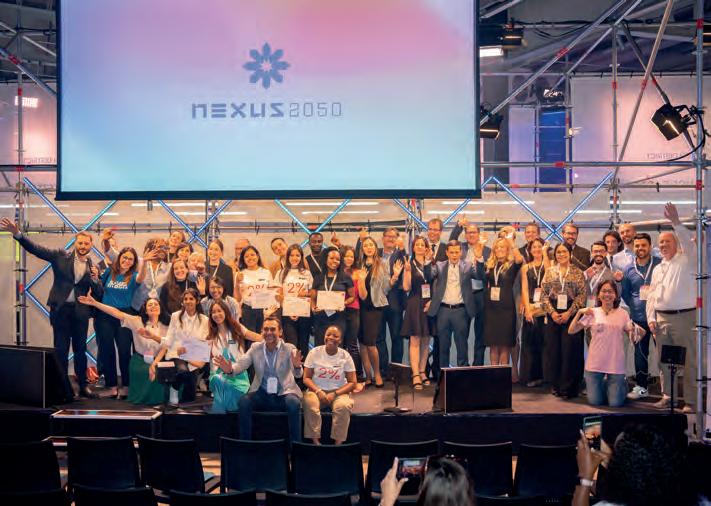

KEYNOTE :
Sandkëscht, the data protection-focused regulatory sandbox by Sadia Berdai (Legal Advisor - CNPD)




KEYNOTE :
How is Luxembourg driving innovation in cybersecurity?
Bertrand Lathoud (Senior Advisor of the CEO - Luxembourg House of Cybersecurity) and Rossana Pollio (Legal Advisor - Luxembourg House of Cybersecurity)

KEYNOTE :
Driving Forward: Advancing the Frontier of Autonomous Mobility
Raphael Frank (Senior Research Scientist - SnT, University of Luxembourg)
KEYNOTE :
Liberate Talent for the Future by Tiago Forjaz (Serial Entrepreneur, CEO and Keynote Speaker - The Epic Talent Society)
PANEL :
VC Fundraising in 2024 and Beyond
by Pitch Me First & Kapital
With the participation of Raphael Betti (Head of Equity Risk Management – EY), Michael Ströck (Co-Founder & CEO - Allocator One), Owen Reynolds (Principal - TEKLAS Ventures), Nathalie Jeneral (EIC Fund Investment OfficerEIB), Lisa-Marie Fassl (Managing Partner - Fund F) Moderated by Tülin Tokatli (CEO, Founder - Pitch Me First)


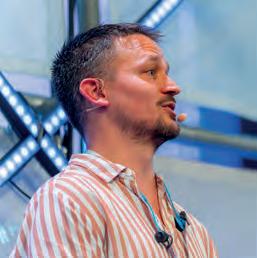


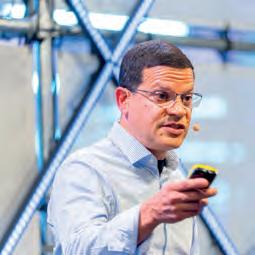

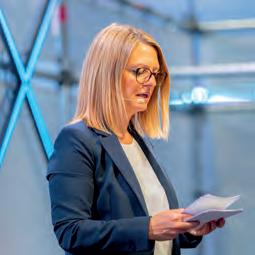
1 Mara Kroth (Co-Founder & Director - Golden Me)
2 Jeff Kaufmann (Project Manager - BEE SECURE)
3 Dr. Thibaud Latour (CEO - Luxembourg Media & Digital Design Center)
4 Jenna Pütz (Communication Officer - Digital Learning Hub)
5 Dr. Sergio Coronado (CIO at NATO Support and Procurement Agency (NSPA) & CEO/Founder of Luxembourg Tech School)
6 Tine Larsen (President - CNPD)
7 Cathia Gromczyk (Director - INFPC)
8 Aline Muller (Chief Executive Officer - LISER)
9 Isabelle Schlesser (Director - ADEM)
10 Marco d’Amico (Deputy Managing Director at Digital Learning Hub)
11 Moderated by Dr. Daniela Gierschek (Training managerDigital Learning Hub)


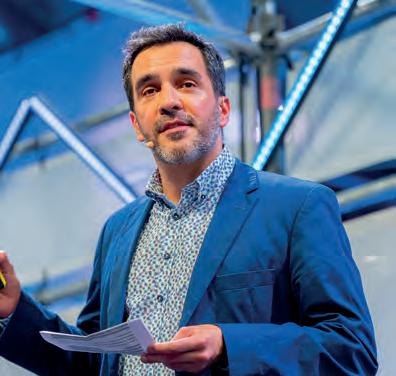


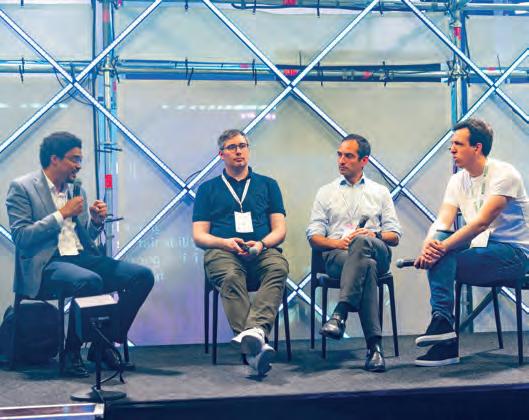
REINVENTSKILLS :
Fostering Female Talent In Fintech by The LHoFT, The Luxembourg Tech School & The National Research Fund
With the participation of Mireille Adjaouté, Aleksandra Amroune, Hinde Baddou, Patricia Becerra, Luisa Bertoldi, Hannah Boughton, Tanya Endshpill, Natalia Jurado, Yukari Kato, Mara Kroth, Moc-Yung Le-Tu, Diwei Liu, Hashini Liyanage, Megan Molitor, Cecile Nivlet, Clar
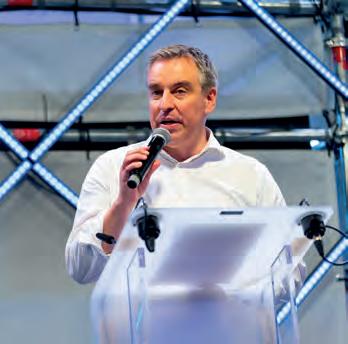
OPENING REMARKS :
Claude Meisch (Minister of Education, Children and Youth, The Government of Luxembourg)
KEYNOTE :
The superpower of interdisciplinary and transversal approaches for innovation by Jens Kreisel (Rector –University of Luxembourg)


KEYNOTE : Mind and Machine: AI-Driven Health Psychology for Disease Prevention by Anja Leist (Full Professor – University of Luxembourg)

PANEL :
ReinventLives: AI and Machine Learning for Disease Prevention
With the participation of Pauline de Breteuil (Entrepreneur, Investor and Senior partner UI InvestissementMajycc Innovation Santé), Anja Leist (Full ProfessorUniversity of Luxembourg), Moderated by Meagan Loyst (Founder & CEO - Gen Z VCs)

KEYNOTE :
Investment and Innovation in health care by Pauline de Breteuil (Entrepreneur, Investor and Senior partner UI InvestissementMajycc Innovation Santé)
PANEL :

KEYNOTE : Zero Risk Startup by Paulo Andrez (Forbes Books & Amazon Bestselling Author, President Emeritus –EBAN, European Business Angel Network)
Startup Risk Mitigation and investment attractiveness
With the participation of Paulo Andrez (Zero Risk Startup), Cristina von Mayer (Risk Taking Expert), Benjamin Tillier (Dedicated VC) Moderated by Luis Galveias (LPEA)



Approximately 150 startups from various technology sectors, all exhibitors at Nexus2050, participated in this event. The audience included investors, mentors, entrepreneurs, media, and other industry professionals, offering a unique opportunity for networking and fruitful exchanges.
Written by ERIK LINDER
The «Luxinnovation Startups Demo Arena» was a dynamic and interactive space where the startups of Nexus2050 showcased their innovative ideas, products, and services. The primary goal of this arena was to provide a platform for startups to gain visibility, facilitate meetings and exchanges among participants, and attract the attention of potential investors. All exhibiting startups had the opportunity to pitch in the Arena.
A jury assessed each one of them, and in the end, there was a winner...
Thank you to all the members of the jury listed below:
TEONA KHUBUTIA LBAN Manager
MICHEL RZONZEF LBAN President
JASON HISHMEH Get Startup FundingPartner / Investor / CTO
VICKIE HISHMEH Get Startup FundingPartner and Investment Director
NASSIM KERDJOUDJ KEYENN CEO
GRÉGOIRE YAKAN Batipart Head of Innovation
PAULO ANDREZ Zero Risk StartupAngel investor and author
MARC VINCENT La French Tech EstDirecteur
SATURNIN PUGNET Worldcoin Founding Member
ANTHONY CANNELLA EY Partner - TMT leader
CLELIA BECK Cycle Group Co-Founder
SVEN BALTES Luxinnovation Gie Manager - Start Up Relations
OWEN REYNOLDS Teklas Ventures Investments
FELIX WEIS Luxinnovation Startup Advisor
CHRISTOPHE BIANCO Excellium - A thales Group Company Managing Partner
SEBASTIEN WIERTZ Paul Wurth InCubGeneral Manager
ALAIN RODERMAN Expon Capital Managing Partner
JÉRÔME WITTAMER Expon Capital Founding Partner
LILY WANG Expon Capital Partner
MENACHEM TABANPOUR gener8tor Managing Director
AMÉLIE MADINIER Le Village by CA Luxembourg Directrice
LUIS GALVEIAS LPEA COO
OLIVIER ZEPHIR Technoport Business Incubator Senior Business Advisor
NATHALIE JENERAL EIB, investing from EIC Fund Investment Advisor





3


5 2
Codepresso aims to help companies and organisations find--and retain--tech talent. Delano caught up with global growth manager Saebyuk Lee at the Nexus2050 conference in Luxembourg to hear more about what the startup offers.
A key challenge that many organisations face is finding and retaining qualified IT talent. South Korean startup Codepresso has a solution for that.
Founded in 2019, Codepresso counts Samsung Electronics, Hyundai and SK Telecom among its biggest clients. It specialises in tech talent attraction and acquisition, global growth manager Saebyuk Lee told Delano during an interview during the Nexus 2050 tech conference at Luxexpo on 27 June 2024, and “streamlines each step of acquiring qualified tech talent, from inception to termination.”
Four services
Codepresso provides four main services, explained Lee. First, they provide companies with quantitative, project-based assessments that can test candidates applying for jobs. Second, to help bridge skills gaps, Codepresso provides with hands-on training. Third, the company also carries out data-driven management. And last, but not least, they have launched a cross-border IT recruitment platform. Once people have taken the assessment, “they can showcase their capabilities on our platform,” said Lee. “Organisations, companies from anywhere around the world can access our platform to easily find the most suitable candidates. But it’s all based on quantitative metrics.”
The firm, which already has a team of roughly 35 people and revenue of roughly $3m, is going global. The South Korean startup has already incorporated in the UK
and is “almost done setting up with incorporating in Luxembourg,” said Lee. “We’re just waiting for the final step,” which will probably be done in the coming days, and “we’re also incorporating in Japan as well.”
So what are Codepresso’s plan in the grand duchy?
Luxembourg will be the gateway for Codepresso to expand their market in Europe
Saebyuk Lee, global growth manager, Codepresso
“Codepresso came to Luxembourg three years ago,” explained Lee, where they carried out market research and met potential clients, the government and partners. Afterwards, the company decided to incorporate here. “Everyone in Luxembourg--the government, companies, organisations--they are working as one team to support foreign companies to do business activities here. Once we have the incorporation here, they consider me as a Luxembourg company, not a foreign company, then they give the full support.”
“From now on, we will be finding potential customers and partners to expand our market in Europe. Luxembourg will be the gateway for Codepresso to expand their market in Europe.” Moreover, Codepresso’s solutions aren’t just for tech companies, but can be useful for any company that has software developers, small and large. “There is no limitation on our target,” he added. The company can also help with digital transformation, for instance, and has training content specific to upskilling and reskilling traditional workers.
Codepresso was one of some 200 startups that were present at the Nexus2050 event, and received--just a few hours after our interview--an award as the winner of the startup pitches during the seated dinner that closed the conference.


COMPANY
COUNTRY
2ND HOME Germany
3D UTU Ukraine
AC BIODE Japan
ACE FUND Independant
ACTIVE ASSET ALLOCATION France
AERND UKRAINE LLC Ukraine
AI TECH UK United Kingdom
AIPLUX Taiwan
ALMEXOFT Ukraine
ANOTE Luxembourg
ARSPECTRA Luxembourg
ARTHIS France
ARVICOM Luxembourg
BIM-Y Luxembourg
BITAFFIX United Arab Emirates
BLUE LAKE VC Independant
BODYFEED France
CAIRN DEVICES France
CARBON FLY Japan
CARDIOMO Ukraine
CLIMATE CAMP Belgium
CONNECTOLOGY Independant
CONSULTANT Ukraine
COOLROOL France
DCINNOVATION Luxembourg
DEEPMINER United Kingdom
DROPSLAB TECHNOLOGIES Luxembourg
ELLEQUANT Luxembourg
FABSTWINES Luxembourg
FILS United Arab Emirates
FINSTART France
FLASH PARK Spain
FLEXHORIZON France
FLUXHR Ukraine
FLYNEX Germany
FOUR POINT SPACE Poland
FREEDOMCODE Ukraine
FREEDOMEE Brazil
FRENCH TECH EST France FUNDVIS Luxembourg
GENIE ENTERPRISE DEUTSCHLAND Germany
GRAMBELL United Arab Emirates
HAPTICMEDIA France
HERINGS South Korea
HOWCOW Ukraine
IMKI France
INDATACORE Morocco
INSTO Taiwan
INTEGRA WORKS United Arab Emirates
INVESTSET Luxembourg
INVOPORT Luxembourg
INYUS France
IT'S UP TO YOU the Netherlands
IWARRANTY United Kingdom
JIANGSU JINGTIAN TECHNOLOGY China
JOOXTER France
KARBIKES France
KATARU CO., LTD. Japan
KLIMATO United Kingdom
KOTICHARGE Finland
LACTOSOLUTION Italy
LBAN Luxembourg
LETZAI Luxembourg
LETZTRAIL Luxembourg
LIGHTIGO SPACE Czech Republic
LINGUA CUSTODIA France
LOCATIONMIND INC. Japan
LOCKULAR United Kingdom
MATCH JOB France
MG-IB France
MYELIN-H Luxembourg
NAMKIN France
NANJING ODYSSEY ARTIFICIAL INTELLIGENCE TECHNOLOGY China
NARU SECURITY South Korea
NEON Luxembourg
NEWIRED Italy
NORDIC FINTECH COMPANIES EUROPEAN HUB Luxembourg
NOZVAT France
PASSBOLT Luxembourg
PIXTRAKK France
PLUTO CARD United Arab Emirates
PRANA Ukraine
PROGALIT Ukraine
PSYTECH VR Luxembourg
QAREEB Algeria
RAFINEX Luxembourg
REJUSTIFY Luxembourg
RESPECTUS Luxembourg
RSS-HYDRO Luxembourg
SAFEAI South Korea
SALEE Ukraine
SECONDLIFE Luxembourg
SHANGAI JIDOU SCIENCE AND TECHNOLOGY China
SHANGAI ZHUYU AUTOMATION TECHNOLOGY China
SIMPLE WINE France
SOFTBEES Ukraine
SOPIAD Belgium
SPACE BACKEND Spain
SPACEDRONE France
SPENDBASE Ukraine
TECHNOVATOR Ukraine
THAINK2 France
THE WIW France
THERMALYTICA INC. Luxembourg
TIJO STUDIO Luxembourg
TILDA South Korea
TIQUEST Luxembourg
TOPPAN IDGATE CO., LTD Taiwan
TRACE CRYSTAL Luxembourg
TRACKGENESIS United Kingdom
TRENDTRACKER Belgium
TROJAN SYSTEM Ukraine
TURING SPACE Taiwan
UPLIFT Luxembourg
USF (UKRAINIAN STARTUPS FUND) Ukraine
USPACY Ukraine
UTOCAT France
VAULTYS France
VESTIS LABS Luxembourg
VIDEOBOT Finland
VISENSYS Germany
VISUAL ALPHA Japan
VIZIOSENSE France
VSION South Korea
WANTENT Ukraine
WAVES Luxembourg
WAVY MEET Luxembourg
WEALTH DYNAMIX United Kingdom
WEO Luxembourg
WUDO France
XENOAPP France
ZORTIFY Luxembourg
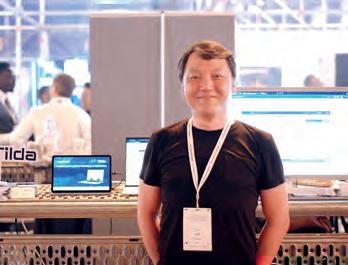
Established in Seoul in 2021, Tilda aims to optimise decision-making in industry and manufacturing. CEO Ji Ryan Chung was in Luxembourg for the Nexus2050 tech conference and sat down with Delano to talk about the solution his startup is working on.
In manufacturing facilities, there are processes that involve dozens of different variables. But “human experts cannot be as accurate as machine learning” when it comes to making decisions, Ji Ryang Chung told Delano during the Nexus2050 tech conference at Luxexpo on 27 June 2024. Chung is the CEO of Seoul-based Tilda and was in the grand duchy to pitch his startup. “That’s not because of anyone’s fault--that’s just the nature of human beings.”

At Luxembourg’s Nexus2050 tech conference, Delano sat down with Joon Kim, CEO and founder of the Seoul-based startup Naru Security, to hear about threat hunting, cyber intelligence and more.
The Nexus2050 tech conference brought together some 200 startups at Luxexpo
The Box on 26-27 June 2024, including Naru Security, a cybersecurity company that was established in South Korea in 2010. CEO and founder Joon Kim, who was in Luxembourg to pitch his company, began his career at the Korea Internet & Security Agency as a security incident responder. Kim is also a national joint incident response team member and has served as a cyber security advisor for the Korea Cyber Command and National Police Agency.

Free to users, the Coolrool app, which enables young athletes to share journeys to their competition venues, will be up and running next season in Luxembourg, a few months after an encouraging launch in France. We found out more at Nexus2050, the tech conference taking place at Luxexpo The Box.
It’s not always easy to combine your desire to sleep in on a Sunday morning with the obligation to take your youngest to her handball match at 9.30am sharp!
The Coolrool app, which has been active on the French side of the border since November, aims to give parents a bit of their free time back, by offering young athletes and sports fans the chance to carpool in the vehicle of another parent or a sports club official.
The NC3 Cybersecurity Observatory provides actionable insights for a proactive cybersecurity strategy by giving information on threat trends as well as the current state of the cybersecurity market.
Empowering organizations with unbiased, reliable, and targeted cybersecurity insights.
Market Intelligence
Providing insights on the state of the cybersecurity market in Luxembourg .
With its open economy, multilingual workforce and solid support for innovation, Luxembourg is an attractive location for companies targeting the broader European market.

Located in-between Belgium, France and Germany, the country directly borders two of the EU’s main consumer markets, and 60% of the EU’s GDP can be accessed within a two-hour flight.
Luxembourg’s economy is strongly export-oriented and the country has a well-developed legal and regulatory framework for international trade. Companies that come here are able to target the wider European market from day 1.
Companies have access to one of the EU’s most highly skilled workforces. 74% of the
workforce is made up of foreign nationals. English is a common business language. Business structures become international and their products multilingual from the very beginning, and employees frequently have valuable networks from their home countries.
Luxembourg is also firmly committed to helping companies coming here access the EU marketThe Fit 4 Innovation – Healthtech Market programme supports companies developing digital medical devices obtain the CE marking that is compulsory for commercialisation in the EU.
The renowned startup accelerator Fit 4 Start provides coaching, equity-free funding and access to key networks that help startups succeed with scaling their business in Europe. It gives digital, space and healthtech ventures fundamental insight into the European market and help them optimise their offerings and go-tomarket strategies.


The Sigma Stage at Nexus2050 hosted three side events: Digital Skills Matchmaking, MyConnectivity, and Supercomputing Day. These events featured discussions on fostering digital partnerships between companies and impact organizations, advancements in connectivity such as 6G and quantum communications, and supercomputing innovations. Experts and industry leaders shared insights on emerging technologies, innovative business models, and strategies for digital transformation, emphasizing real-world applications and future trends.


IMS Luxembourg organised the 4th edition of the Digital Skills Matchmaking in collaboration with the Media, Connectivity and Digital Policy Department of the Ministry of State /Digital Luxembourg, the Digital Skills and Jobs Coalition, and the European Social Fund during Nexus 2050.
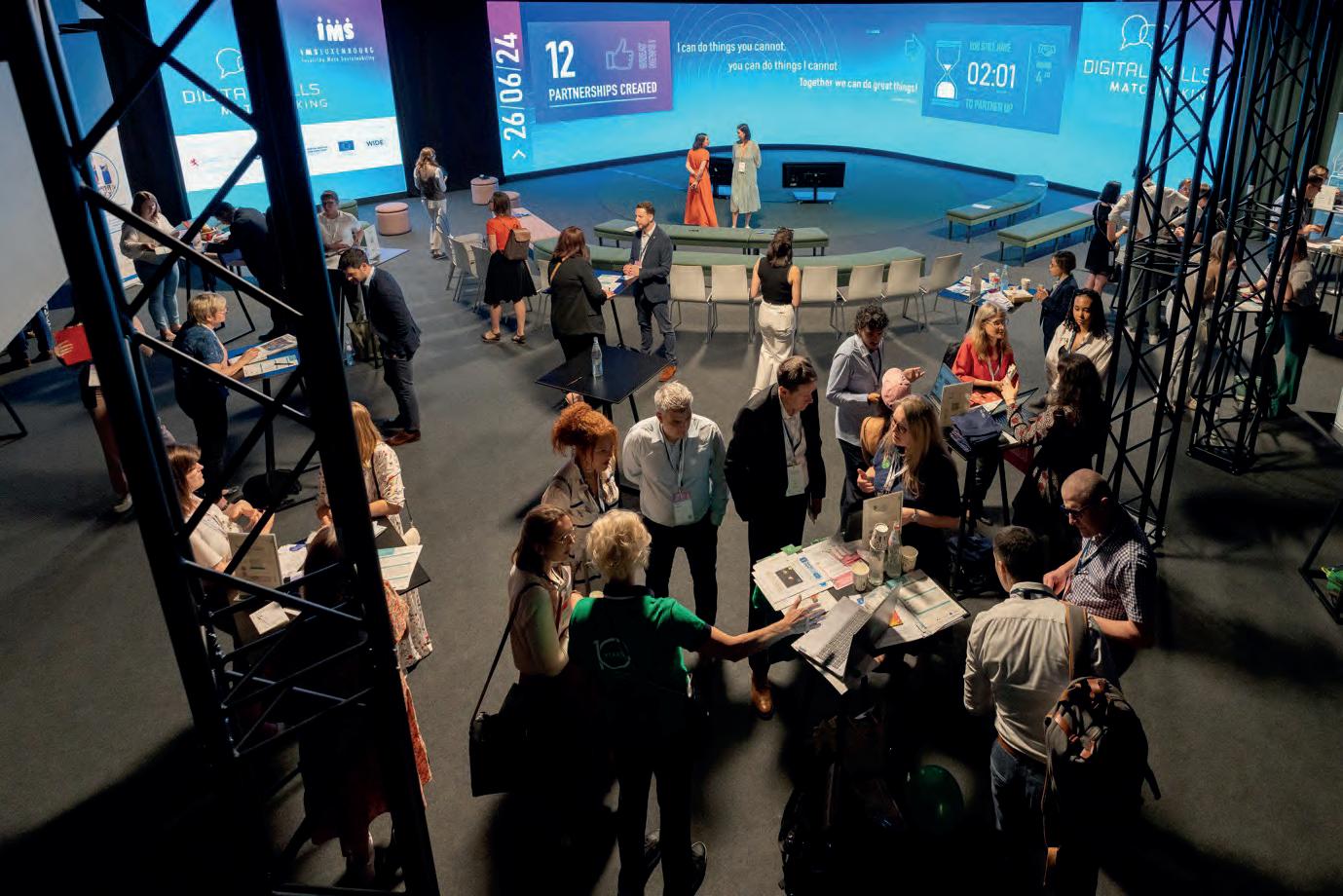
32 partnerships signed
During the speed meeting, 23 digital entrepreneurs met with the 26 companies present. As a result, 32 partnerships were signed. To put these partnerships into practice, a follow-up workshop (on 25 September) and tripartite meetings are planned.
This meeting aims to facilitate exchanges and create win-win digital partnerships between companies and impact initiatives (associations, NGOs, foundations, public organisations, schools, etc.). These partnerships enable companies to support projects through volunteering, skills sponsorship, equipment donations, sponsorship, help with integration, etc. In return, companies benefit from significant added value: concrete implementation of the CSR policy, attraction and retention of talent, development of staff skills and affirmation of the company’s values.
An event as part of the Digital Skills Partnership project
Digital Skill Matchmaking is part of the Digital Skills Partnership project funded by the European Social Fund and the Media, Connectivity and Digital Policy Department of the Ministry of State/Digital Luxembourg. It comprises several stages: preparation workshops, organisation of the Digital Skills Matchmaking, workshops to monitor the partnerships signed, a survey, and publication of an inventory of companies’ and associations’ practices in terms of partnerships and skills sponsorship.
MyConnectivity hosted an engaging 2-hour side event in the SIGMA Room on «The Future of Connectivity in Luxembourg», offering a visionary peek into how AI technology will transform our lives in terms of connectivity.
The event opened with a dynamic introduction by MyCo, MyConnectivity’s digital ambassador and AI avatar, and moderator, Patrizia Luchetta, whose synergy set the tone for a unique event where tech and humanity collaborated hand in hand.
Event Highlights
The two-hour event unfolded in three engaging segments, featuring distinguished speakers from various sectors, culminating with innovative student pitches from «The Future Workshop,» MyConnectivity’s flagship initiative.
Segment 1: MyConnectivity team set the stage by presenting an overview of their pioneering initiatives, including vertical cabling, the creation of comprehensive connectivity roadmaps, and collaborative training programs. They also introduced their Advisory Community—a dynamic working and discussion group that has rapidly grown to include over 200 experts from a wide range of industries. The session also featured an inspiring presentation by Misch Strotz (NEON) and Gil Galvao (Tijo Studio), the creative minds behind MyCo, who shared their journey in bringing the AI avatar to life.
Segment 2 of the event stood out by offering a progressive narrative, starting with traditional and current connectivity methods and seamlessly transitioning to the latest and future innovations.

Topics Discussed:
Copper phase-out and its impacts by Luc Tapella, Director, Institut Luxembourgeois de Régulation (ILR), Luxembourg
Computer vision for telecom compliance by Cheikh Boumedyane, CCO, INVENIAM, France
Road to 6G by Sebastien Faye, 6G Technology & Innovation Line Manager, Luxembourg Institute of Science and Technology (LIST), Luxembourg
Quantum Communications: The LUQCIA Project by Junaid ur Rehman, Research Scientist, Developing National Quantum Communication Infrastructure for Luxembourg, SnT, Luxembourg
Intergalactic Connectivity by Avanti Sharma, Pre-teen Technology Specialist & Head of Business Development at Workshop4Me
The Future Workshop: Student Pitches
The event culminated with pitches from «The Future Workshop,» where students from Luxembourg and Belgium showcased their vision of a connected Luxembourg with their AI-driven ideas.
Supercomputing Day 2024 showcased the latest advancements in high-performance computing. Organized by Supercomputing Luxembourg (LuxInnovation, LuxProvide & Université de Luxembourg) with support from EuroCC2 and Women in HPC, the event featured keynotes on global supercomputing trends, quantum computing applications, AI in finance, and the role of HPC in startups, space and life sciences. Highlights included insights from industry leaders, discussions on diversity in tech, and the transformative potential of supercomputing across various sectors.




1 Serge Weyland (ALFI), Georges Wantz (Deloitte)
2 Gosia Kramer (The Office), Jana Degrott (Obama Foundation)
3 Jim Kent (Kent Media), Nathalie Reuter (Walk the talk), Claude Marx (CSSF)
4 Andrea Munteanu (Promus Ventures), Jonathan Prince (Finologee), Nicolas Sullly (Accenture)
5 Jacques Weniger (neon internet), Misch Strotz (LetzAI)
6 Anne Goujon (BGL BNP Paribas), Christophe Atten (Spuerkeess), Emma Sezen (Artefact), Riadh Khodri (Pictet)
7 Françoise Frieden (Luxtram), Isabelle Faber (POST)








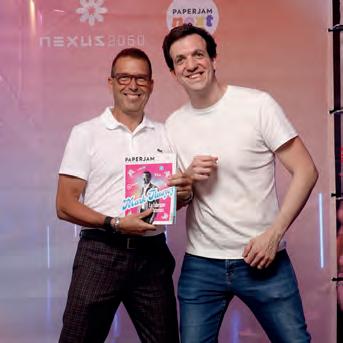

1 Mike Koedinger (Nexus2050), Mark Tluszsz (Mangrove), Xavier Bettel (Ministry of Foreign Affairs of Luxembourg), Sasha Baillie (Luxinnovation), Maurice Lévy (Publicis Groupe), Kamel Amroune (Nexus2050), Michael Lévy (Ycor)
2 Ouma Sani (WIC Senegal), Marina Andrieu (WIDE ADNCO), Véronique Zilotto (Ellan), Lisa-Marie Fassl (Funf F), Stefania Quaini (Angels4Woman)
3 Stéphane Pesch (LPEA), Nasir Zubairi (LHoFT), Serge Weyland (ALFI)
4 Damien Chasseur and his team (CBTW)
5 Eiso Kant (Poolside), Eryka Lehr (Google), César Maklary (Fluidstack), Stéphane Fisch (Argo)
6 Mark Tluszsz and Yannick Oswald (Mangrove)






7 Paul Konsbruck (Luxconnect)
8 Thomas Moser (SNB), Biba Homsey (Amosy Legal), Romain Swertvaeger (EY)
9 Mike Koedinger (Nexus2050), Gilles Roth Minister of Finance, Kamel Amroune (Nexus2050)
10 Merete Clausen and Anne Calteux (European Commission)
11 Valentin Dufour, Schon Fabien, Kelian Moreno and Louis Loschetter (Skandal Agency)
12 Team of Digital Learning Hub, Koen Cloostermans, Marco d’Amico, Serge Linckels, Jenna Putz, Yves Sibenaler, Christian Buchler
Written by PAPERJAM CLUB Photos FLORIAN TALON / XANTOR
Participants and partners of the inaugural edition of Nexus2050 met in Luxembourg’s VilleHaute on Tuesday evening for a warm-up event. The event not only gave them the opportunity to pick up their badges early at the city’s emblematic Cercle Municipal, but also to start their networking.
The Nexus2050 pub crawl was the perfect chance for attendees to meet international professionals, exploring establishments such as Amore, Bellamy, Go Ten, Urban and Wellem.
This preliminary gathering set the scene for the two-day show to come, promising to be a source of business and inspiration. More than 5,000 people were expected to attend the conference at Luxexpo.










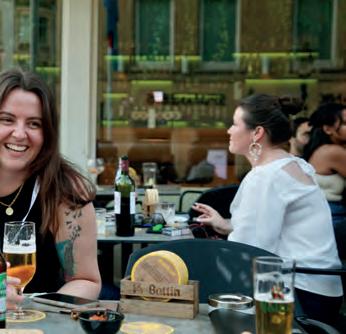

Written by ERIK LINDER
For the Closing Seated Dinner Ceremony of Nexus2050, the international tech pulse event held in Luxembourg on June 26 and 27, the organizers had a special guest: Sophia, the robot from Hanson Robotics, took the stage for demos and a Q&A session with the audience.
Nexus2050 offered Luxembourg businesses a comprehensive package, including symposium access, exhibition entry, and exclusive networking events, providing an unparalleled tech and business experience – culminating in the closing seated dinner.
“We developed a formula that allowed Luxembourg businesses to make the most of Nexus2050,” announced Mike Koedinger, co-founder of G.I.E. Nexus2050. “This package included a table for eight people at the grand closing dinner with over 1,000 guests, as well as eight entries valid for both days, providing access to the symposium, all presentations, the exhibition area, and the matchmaking zone, along with numerous cocktails and social events, including the grand opening with the presence of H.R.H. the Crown Prince.”
“Nexus2050 was not only the largest tech event in the Greater Region but also one of the few truly international business events in Luxembourg,” added Kamel Amroune, co-founder of G.I.E. Nexus2050.
“Having a table at the Nexus2050 dinner allowed businesses to bring together employees and clients for a unique networking evening with a dinner curated by the excellent caterer Julien Cliquet.”








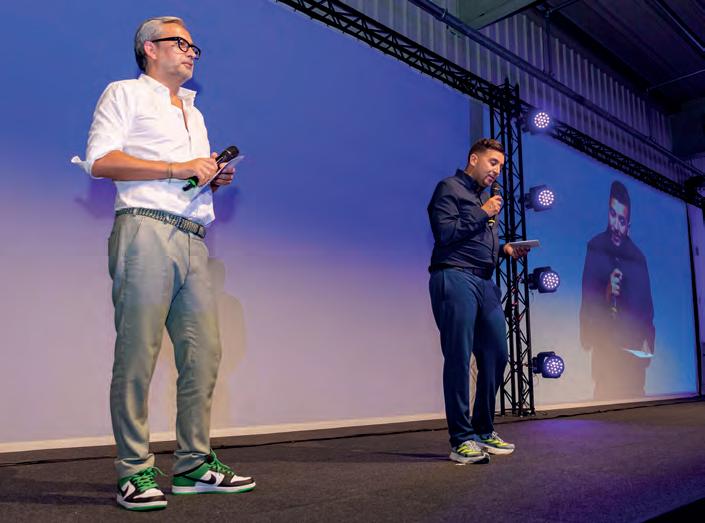
Written by ERIK LINDER
Photos THE DOTS
FOYER and SES teamed up with Nexus2050 to offer sponsored tickets to students. This initiative aimed to give students the opportunity to attend the event and learn about the latest in tech and innovation.
Students who received sponsored tickets had access to the conference and exhibition. Additionally, there was a bus tour the day after the event on the 28th of June, allowing students to visit FOYER and SES and learn more about these companies.
This opportunity provided students with valuable exposure to the tech industry and potential career paths in Luxembourg. Students enjoyed comprehensive access, including entry to the exhibition zone, symposium, and cocktail events.
“I recently took part in the Nexus 2050 tour. We kicked off the morning with a visit to SES in Betzdorf. Seeing their ground infrastructure (antennas) up close and spending time in the control room was very impressive. The engineers shared some great insights into their work, which made the visit particularly relevant given Nexus 2050’s tech focus. The only drawback was not to have stayed there longer!
Later, we headed to Foyer in Leudelange. We discussed with their data science, cybersecurity, and front-end teams, which are key components for any modern insurance company. They also highlighted some of the perks of working for their company.
Overall, it was a great networking opportunity and addition to Nexus 2050. The tour provided a solid glimpse into Luxembourg’s tech and insurance sectors, and it was a valuable experience for anyone interested in these fields.”

















A JOINT-VENTURE OF MARKETING
COMPANY THE DOTS AND MAISON MODERNE, PUBLISHER OF PAPERJAM.
Premium Institutional Partners
EU Commission, Gouvernement of Luxembourg, City of Luxembourg, Luxinnovation, Luxembourg, Let's make it happen
Global Partner
Chamber of Commerce Luxembourg
Co-founders
Kamel Amroune and Mike Koedinger
Programming
COORDINATION
Erik Linder
CONTENT MANAGERS
Simon da Costa, Sofia Garcia, Sidonie Stire, Yann Roll
TRAVEL AND ACCOMMODATION MANAGEMENT
Margaux Malcourant
Production
HEAD OF PRODUCTION
Dany Lucas & Fanny Antoine
PRODUCTION TEAM
Melissa Grozinger, Sarah Devos, Sabrina Erpelding, Esther Pierard, Alessandra
Gasso, Maxime Bauraing, Marianne
Henrion, Célia Lounnas, Aurélie Paini, Sidonie Stire
STAGE MANAGEMENT
Baudouin Vannoorbeeck, Patrick Ibsen, Shapefactory
ASSEMBLY/DISASSEMBLY TEAM
Quentin Modave & Shapefactory
PROTOCOL
Michel Grevesse-Sovet
TICKETING & APP
Etienne Velasti, Sidonie Stire, Fanny Antoine
OFFICIAL PHOTOGRAPHERS
Eva Krins, Marie Russillo, Romain
Gamba, Benjamin Song, Bastien Colas
Communication
COORDINATION
Mike Koedinger and Erik Linder
GUESTS AND MEDIA RELATIONS
Marie-Jo Gutenkauf
SOCIAL MEDIA - COMMUNITY MANAGER
Nastassia Haux
ART DIRECTION
Cassandre Bourtembourg and Nicolas Boeuf
DESIGN
(Motion Design - Misch Strotz, LetzAI)
SALES
Pierre-Alexis Quirin, Florence
Christmann, Aurélie Paini, Aïssa Abeid
Client success managers
Margaux Malcourant, Morgane
Montaigu, Sarah Devos, Younes Azouaoui
Administrative & legal
CFO Etienne Velasti
Invoicing and accounting
Sylvia Leplang
Service providers
VENUE LUXEXPO THE BOX
Christophe Desenfans & Noam Oussaidene
ARCHITECTURE
Company / Concept & Design 2001, Ludovica Not & Philippe Nathan
TECHNOLOGY HALL 8
Apex, David Junck
TECHNOLOGY HALL 9
MGS, Michel Gavage & Florent Deville
VIDEO CAPTURE & BEHIND-THE-SCENES
LuxAudiVisuals, Jérôme Douché
SILENT CONFERENCE ARTWHERE
Emmanuel Nudel

PRINTING & SIGNAGE LUXVISUAL
Renaud Bigonville
VISUAL COMMUNICATION
Easycom
DECORATION & ARRANGEMENT
Chappes Flore
FOURNITURE
ABC Location
SCAFFOLDING
Omnilux
CATERING CLOSING SEATED DINNER
Julien Cliquet
SYMPOSIUM CATERING
Réimerwee
FOODTRUCKS
Ginette La Frite, Végétatou
WELCOME & SUPERVISORY TEAM
The One
ACCESS CONTROL
system RMS
ROLLING STOCK
Mateco
INSPECTION AGENCY
LuxControl
INSURANCE
Foyer
COLLECTION AND WASTE TREATMENT
Second Life
WEBSITE
RazrCorp
SÉCURITÉ
Protection Unit
MEDIA PARTNERS
Delano, Paperjam, Techsense
HÔTELS PARTNERS
Mama Shelter, Novotel Luxembourg, Royal, Melia
FLIGHT MANAGEMENT PARTNER
Luxair
OFFICIAL VIP SHUTTLE PARTNER
Polestar
BUS SHUTTLES
Emile Weber
MANY THANKS TO GoTEn, Wëllem, Bazaar, Urban, Amore, Cercle Municipal, Luxlait, Chris Hollifield, Alex Panican, Antony Martini, Luxembourg Ukraine Chamber of Commerce, Evgenia Paily, Dennis Wernerus, Ministry of Economy, Michele Gallo
ADVISORY COMMITTEE
Astrid Agustsson, Pascal Bouvier, Steve Breier, Xavier Buck, Simone Hornick, Claudine Kariger, Ananda Kautz, Steven Koener, Sabrina Sagramola, Cindy Tereba, Jerome Wittamer, Nasir Zubairi, Yannick Oswald, Fabrice Aresu, Daniel Kahn, André Emering, Laurent Futin, Markus Payer, Lena Martensson, Jens Kreisel
STUDENT BUS TOUR
Foyer and SES
What’s ? What’s ? What’s ? What’s ? What’s ? What’s ? What’s ? What’s ? What’s ? What’s ?

What’s ? What’s ? What’s ? What’s ?
What’s ? What’s ? What’s ? What’s ?
What’s ? What’s ? What’s ? What’s ?
What’s ? What’s ? What’s ? What’s ?
What’s ? What’s ?
What’s ? What’s ?
What’s ? What’s ?
What’s ? What’s ?
What’s ? What’s ?
What’s ? What’s ?
What’s ? What’s ?
What’s ? What’s ?
What’s ? What’s ?
What’s ? What’s ?
What’s ? What’s ?
What’s ? What’s ?
What’s ? What’s ?
What’s ? What’s ?
What’s ? What’s ?
What’s ? What’s ?
What’s ? What’s ?
What’s ? What’s ?
What’s ? What’s ?
What’s ? What’s ?
What’s ? What’s ? What’s ? What’s ?
What’s ? What’s ? What’s ? What’s ?
What’s ? What’s ? What’s ? What’s ?
What’s ? What’s ? What’s ? What’s ?

What’s ? What’s ? What’s ? What’s ? What’s ? What’s ?
What’s ? What’s ? What’s ? What’s ? What’s ? What’s ?
What’s ? What’s ? What’s ? What’s ? What’s ? What’s ?
What’s ? What’s ? What’s ? What’s ? What’s ? What’s ?
What’s ? What’s ? What’s ? What’s ? What’s ? What’s ?
GLOBAL PARTNER FINANCE DISTRICT PARTNERS

PREMIER INSTITUTIONAL PARTNERS



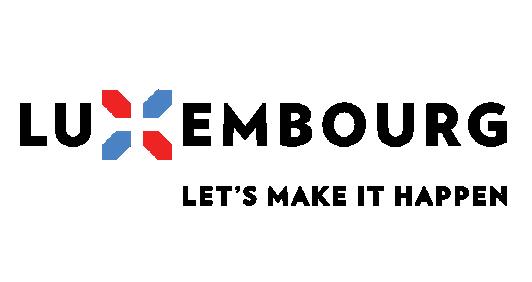
LEAD PARTNER

PREMIER PARTNERS

MAJOR PARTNERS


KEY PARTNERS ASSOCIATIONS






PURETECH DISTRICT PARTNERS
LEAD PARTNER

PREMIER PARTNERS


MAJOR PARTNERS







KEY PARTNERS


SKILLS DISTRICT PARTNERS
LEAD PARTNER

PREMIER PARTNERS



MAJOR PARTNERS



INSTITUTIONAL PARTNERS





